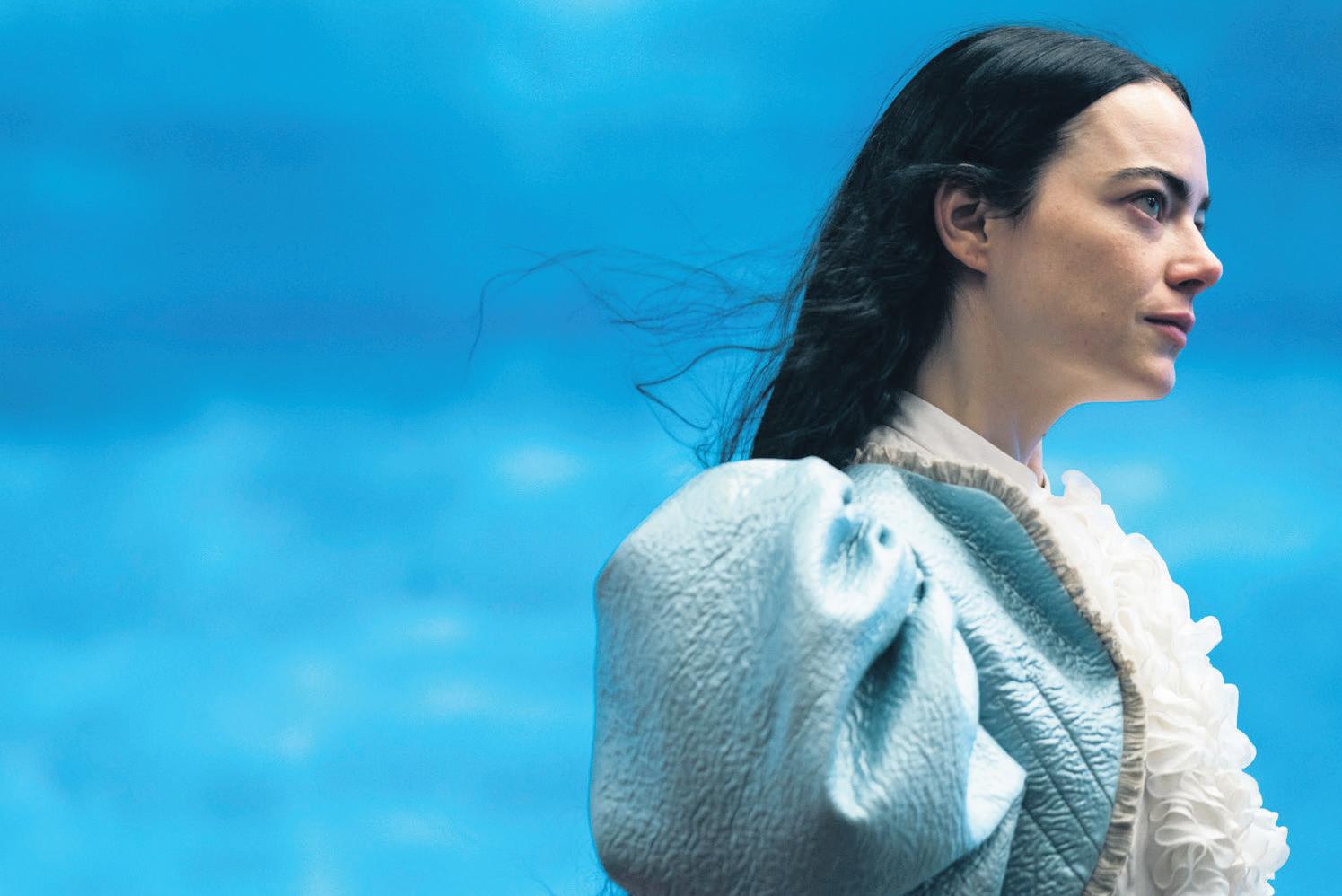



PRESENTS The Best Upcoming Indie Films and Where to Watch Them AUTUMN/WINTER 2023 FREE!
INDIE CINEMA GUIDE
Words: Jamie Dunn
Welcome to the second instalment of the Indie Cinema Guide. This time around we’re looking forward to the film festivals that come thick and fast to Scottish cinemas during the autumn months. We’ve just enjoyed the brief but successful return of Edinburgh International Film Festival in August, and we’re excited to see what Glasgow Film Festival are cooking up for their landmark 20th edition in March. But between these tentpole events, there’s a rich and eclectic network of smaller festivals that are equally as important for creating community and celebrating artistry within Scotland’s film scene.
In the following pages we hear from the directors of two of these much-loved smaller festivals. The French Film Festival’s long-serving director Richard Mowe looks back on three decades of bringing francophone cinema to Scotland, including memories of a supine Agnès Varda, and new SQIFF director Indigo Korres gives us the lowdown on this radical, forward-thinking, community-focused festival celebrating queer filmmaking. And given there are so many festivals coming to a cinema near you this autumn, we’ve created a handy calendar to help you keep track.
As the air gets cooler over the coming months, our cinemas are hotting up with an incredible selection of films coming out on general release. Two of cinema’s elder statesmen – Martin Scorsese and Ken Loach – return with blistering works that may be their last. We speak to Carol Morley, who’s back with a quixotic road movie paying tribute to underappreciated artist Audrey Amiss. And How to Have Sex is the latest in a long line of hugely exciting debuts from a British female director. In Coming Attractions, meanwhile, we look forward to this year’s Palme d’Or-winner Anatomy of a Fall as well as eagerly-anticipated new films from Scottish talent – Girl, by Adura Onashile, and Tish, from Paul Sng.
Perhaps the title we’re most looking forward to is Poor Things, from Greek director Yorgos Lanthimos. Not only is it a virtuosic and highly original piece of cinema, it’s also the first film adapted from a book by the late, very great Glasgow author Alasdair Gray. As I write, Poor Things is making waves at the Venice Film Festival – we can’t wait to see how the film goes down in Gray’s homeland.
Indie Cinema Guide Editorial
2 Opening Credits
Opening Credits
4 Meet the Festivals: We chat with SQIFF’s Indigo Korres and French Film Festival’s Richard Mowe
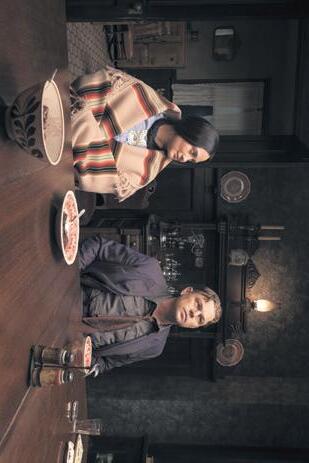

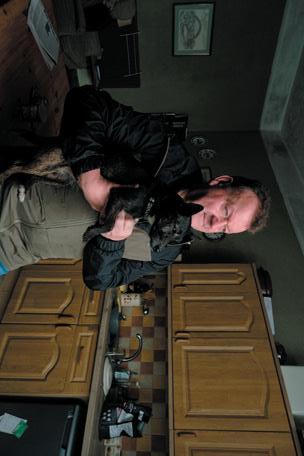
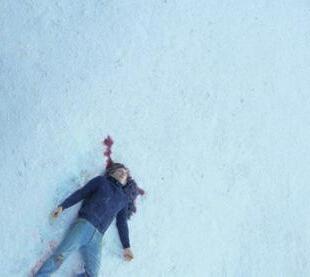
6 Meet the Festivals: A calendar of the best film festivals happening this autumn and winter, from Scotland Loves Anime to the Inverness Film Festival
Features
8 Carol Morley on her road movie biopic Typist Artist Pirate King

Coming Attractions: From Napoleon to Saltburn
Back

Cinemas: Our guide to Powell and Pressburger ahead
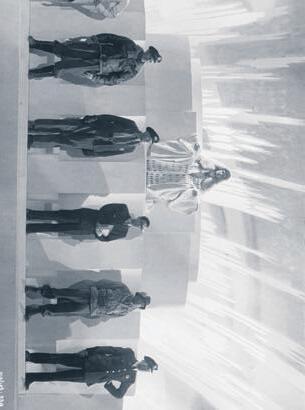
find
how to get monthly two-for-one tickets


3 Autumn/Winter 2023 Contents QUIZ ANSWERS Across 1. CITIZEN
7.
8. STAR 10. OSCAR WIN 14. SALO 15.
18. SCORSESE 20. DUNE 21. KEN LOACH 23.ENVIRONMENT Down 2. IGLOOS 3. EON 4. NUTS IN MAY 5. EGOTIST 6. ARK 9. FILM CANON 11.CAINE 12.RA 13. PIRANHA 16. ER 17. BEDLAM 19. IDA 22. EGO
KANE
GREMLINS
OMNI
Previews 12
14
in
of a UK-wide retrospective 16 Cinema Map 18 Poor Things 20 The Old Oak 22 Killers of the Flower Moon 24 Eileen 26 How to Have Sex 28 Fallen Leaves End Credits 30
at your favourite indie cinemas 31 Crossword Jamie Dunn Editor
George
Sales
Voucher:
out
Phoebe Willison Designer Dalila D'Amico Production Manager
Sully
Rosamund West Editor-in-chief
Produced by Radge Media for Film Hub Scotland
Meet the Festivals
Film festivals in Scotland come in all shapes and sizes. Two of the most anticipated on the calendar are the long-established French Film Festival, and the community-focused SQIFF. We speak to both ahead of their latest editions
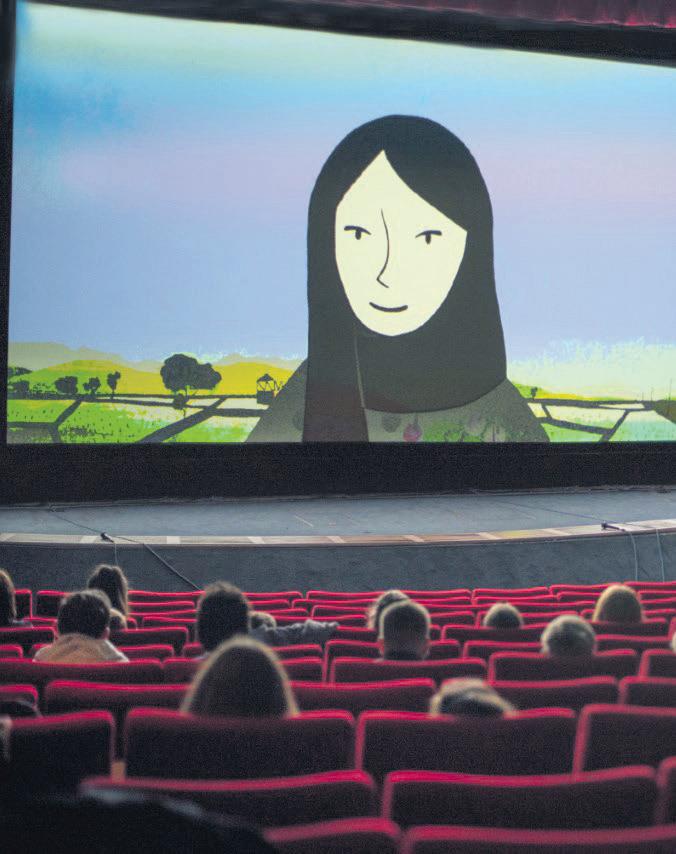
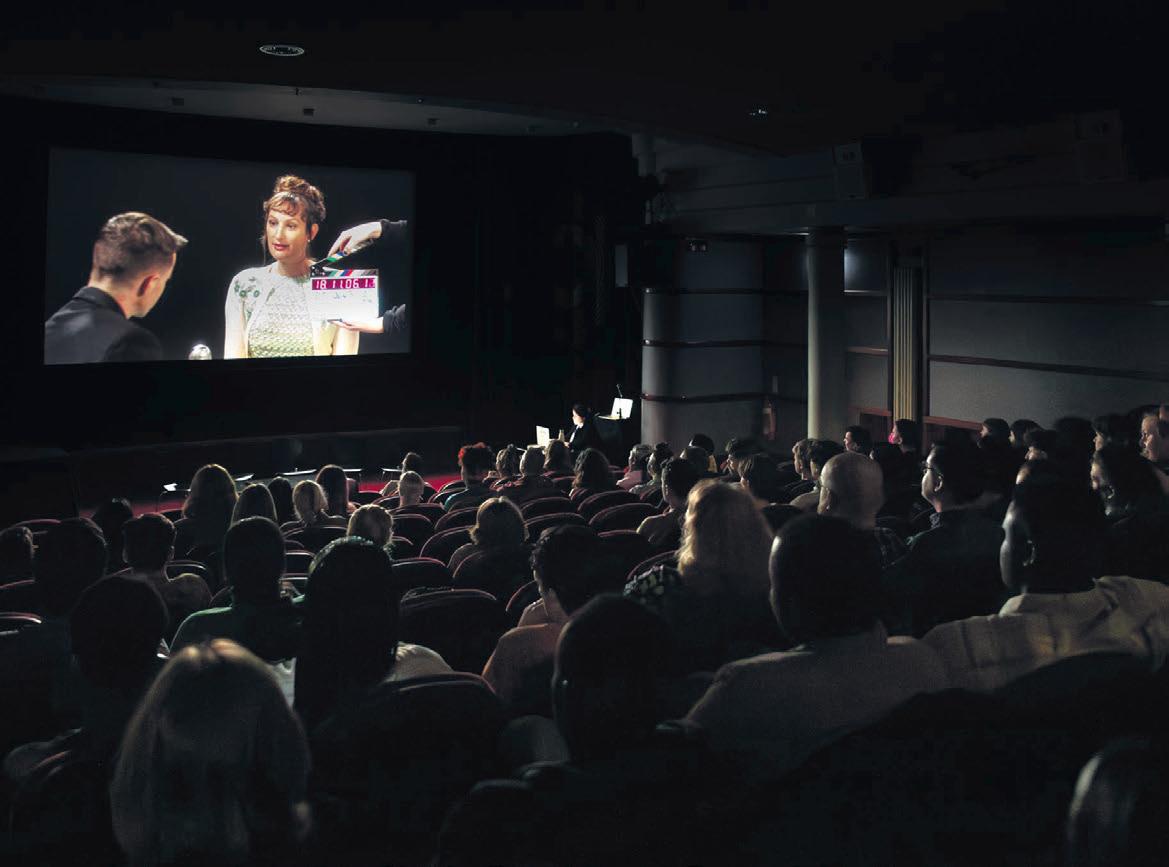
Scottish Queer International Film Festival (or SQIFF)’s new director Indigo Korres looks forward to the next chapter at Scotland’s LGBTQ+ film festival
“SQIFF was set up in 2015 to add to the exciting and growing amount of queer film stuff happening around Scotland. Our aims were to get people talking about, watching and making films. This past year, we’ve expanded our aims to also build community; we had previously been doing this, but now we want to do year-round events for the community, like filmmaking workshops and queer filmmaking groups.
“SQIFF has grown a lot over the past eight years, and people are really excited each year to come to the festival. We didn’t have one last year, and when we announced that it was coming back this year, we were overwhelmed with likes, comments, and reposts on our social media!
“One of my favourite SQIFF memories was being at the opening night shorts screening at one of the first years I worked for SQIFF, and sitting in a packed cinema full of queer people all watching the same films. Some of the work was quite emotional, but watching it together felt cathartic, warm and magical.
“This year, I’m most looking forward to gathering everyone together and hearing from the community about what resonates with them. That’s why festivals are so special: they allow people to gather, which builds community. SQIFF specifically helps the queer community learn more about themselves and our intersectionalities.”
SQIFF runs 26-30 Sep at CCA in Glasgow
sqiff.org
Indie Cinema Guide
Photo: courtesy of Take One Action
Ocean Teal 4 Opening Credits
Photo:
French Film Festival director Richard Mowe reflects on three decades of bringing Frenchlanguage cinema to UK audiences
“The first festival happened in 1992 and was started by myself and fellow journalist Allan Hunter. We both had a powerful sense of a shared community with European cinema but would often ponder why so many great European films never saw the light of day in Britain.
“There were countless French films that might only make a solitary appearance at a film festival and then disappear from view. We had a feeling that something should be done about it. That was how the French Film Festival began.
“Looking back it is heartening to recall how much of an emphasis the festival placed on the work of female directors. In 1993, there were new films by Coline Serreau, Claire Devers, Christine Pascal and Anne Fontaine. Early editions championed Claire Denis, Diane Kurys, Tonie Marshall, Nicole Garcia and Marion Vernoux. The festival also developed a pretty good record for talent spotting – we brought the first features of Cédric Klapisch and Anne Fontaine to British audiences.
“Over the past three decades, the French Film Festival has only grown in importance as a showcase for French cinema and now has a
footprint across more than 40 cinemas across the UK. It has given audiences an early chance to spot rising talents and see in person a galaxy of greats that stretch from Bérénice Bejo to Patrice Chéreau, Yolande Moreau to Antoine de Caunes, Claude Sautet to Roschdy Zem.
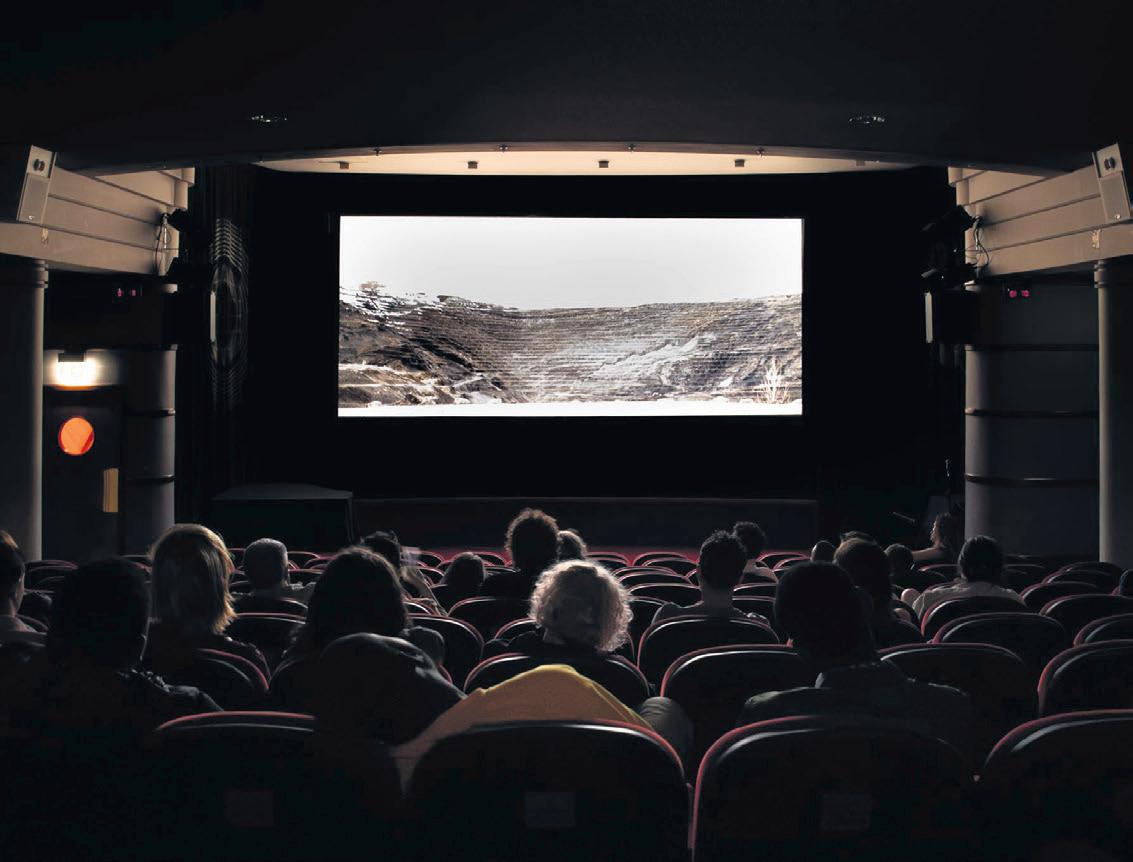
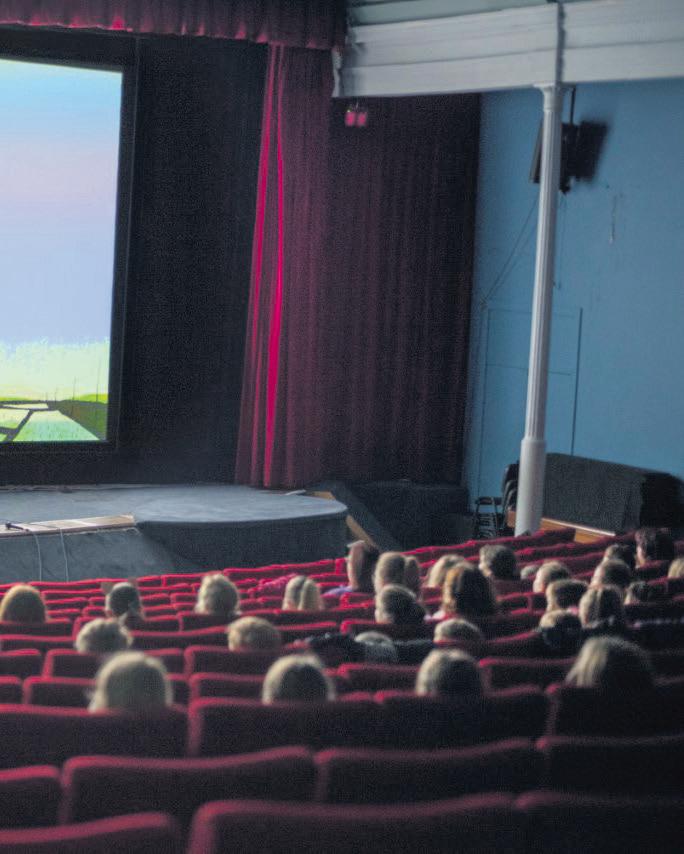
“One of my favourite festival memories is Agnès Varda draped like Cleopatra across the front row seats at Filmhouse in Edinburgh, relaxed and contentedly horizontal as she took questions from an audience who had just watched One Sings, the Other Doesn’t. There was also Bertrand Tavernier meeting up with his old mates from the shoot of Death Watch, which he made in Glasgow.
“Festivals remain important because they’re a celebration of cinema in all its guises and help to uncover new talents and the filmmakers of tomorrow. They provide a showcase for films and directors who might otherwise be neglected or go unnoticed and help to provide a direct connection between audiences and cinema’s creatives.”
French Film Festival UK runs 1 Nov-14 Dec at over 40 venues, including GFT, DCA, Summerhall, Eden Court and many more
frenchfilmfestival.org.uk
5 Autumn/Winter 2023
Photo: Ocean Teal
Edinburgh Spanish Film Festival
30 Sep-26 Oct, various venues in Glasgow, Edinburgh, Inverness & Stirling
In this tenth anniversary edition, expect the usual mix of classics and brand-new titles from Spain and Latin America, as well as a special retrospective programme commemorating Spain’s transition to democracy in the period of 1975-82. As always, many of ESFF’s titles will be screening in Scotland for the first time, and several will have guests in attendance.
edinburghspanishfilmfestival.com
Central Scotland Documentary Festival
2-6 Nov, Macrobert Arts Centre (Stirling), Macrobert Moviehouse (Plean), The Engine Shed (Stirling). Documentaries highlight our passions and plights; they encourage us to laugh, cry, learn, question, critique and be entertained. Add cinema to the equation and you also add discussion, be it with a director, panellist or the person sitting next to you. CSDF's aim is for conversation to continue long after the last screening has ended.
macrobertartscentre.org/cs-doc-fest
Discovery Film Festival
21 Oct–5 Nov, Dundee Contemporary Arts
For 20 years Discovery has been bringing the very best of international cinema for children and young people to Scotland. The programme features films from around the world, with something to suit every age, from infants to teens. Tickets are priced on a Pay What You Can scale, and there are free creative activities to try each weekend of the festival.
Inverness Film Festival
3-9 Nov, Eden Court
The Inverness Film Festival punches above its weight, offering folk a unique chance to discover new cinematic frontiers across six days. They’ll soon be announcing the full lineup for the 21st edition, packed with features, shorts and hotly anticipated Scottish premieres that will remind audiences why cinema remains such a vital force in our culture.
discoveryfilmfestival.org.uk
eden-court.co.uk/inverness-film-festival
Indie Cinema Guide 30 October S S M T W T F S S M T 1 2 3 4 5 6 7 8 9 10 11 12 13 14 15 16 17 18 19 20 21 22 23 24 25 26 27 28 29 30 31 4 5 6 11 12 13 18 19 20 25 26 27
6 Festival Calendar
Scotland Loves Anime
3-5 Nov, GFT; 6-12 Nov, Cameo Edinburgh
SLA is the UK’s longest-running film festival of Japanese animation. This year is its 14th edition, and as ever it will showcase a diverse range of animation that UK audiences usually wouldn’t get a chance to see on the big screen. Before each screening, there will be an introduction from anime expert Dr. Jonathan Clements, who’ll put these wonderful films in context.
lovesanimation.com
Africa In Motion
17-26 Nov, GFT, Centre for African Studies (Edinburgh University), Glasgow Women’s Library
Africa in Motion presents an exciting programme of new releases, archive films, commissions, special seasons and events. Its mission is to empower artists to take control of their narrative, celebrate heritage, and showcase their stories to global audiences. The festival practises this by exploring the complexity and vibrancy of the continent of Africa, the people who live there, and the stories it holds, past, present and future.
africa-in-motion.org.uk
Havana Glasgow Film Festival
15-19 Nov, GFT & CCA Glasgow
Havana Glasgow Film Festival celebrates the twin cities of Glasgow and Havana through a programme of Cuban film screenings, discussions and joyful cultural events each November. The upcoming ninth edition will focus on cinema as a force for positive change – expect everything from documentaries to DJs, actor Q&As to animation.
hgfilmfest.com
Take One Action
5-9 Dec, CCA & GFT; regional tour with Screen Machine, Oct-Dec
Bridging cinema and social justice, Take One Action explores the systems underpinning global inequality and the climate crisis, empowering audience to envisage tangible action. Alongside year-round events and community screenings across Scotland, Take One Action’s five-day festival in Glasgow this year will focus on ‘renewal’: of art, material, environment, and society.
takeoneaction.org.uk
7 Autumn/Winter 2023 W T F S S M T W T F November December 1 2 3 7 8 9 10 14 15 16 17 21 22 23 24 28 29 30 1 2 3 4 5 6 7 8 9 10 11 12 13 14 15 16 17 18 19 20 21 22 23 24 25 26 27 28 29
The Road Movie Less Travelled
Carol Morley chats to us about her tragicomic road movie Typist Artist Pirate King, which pays tribute to the talented artist Audrey Amiss, whose promising career was curtailed by mental illness
Words: Jamie Dunn
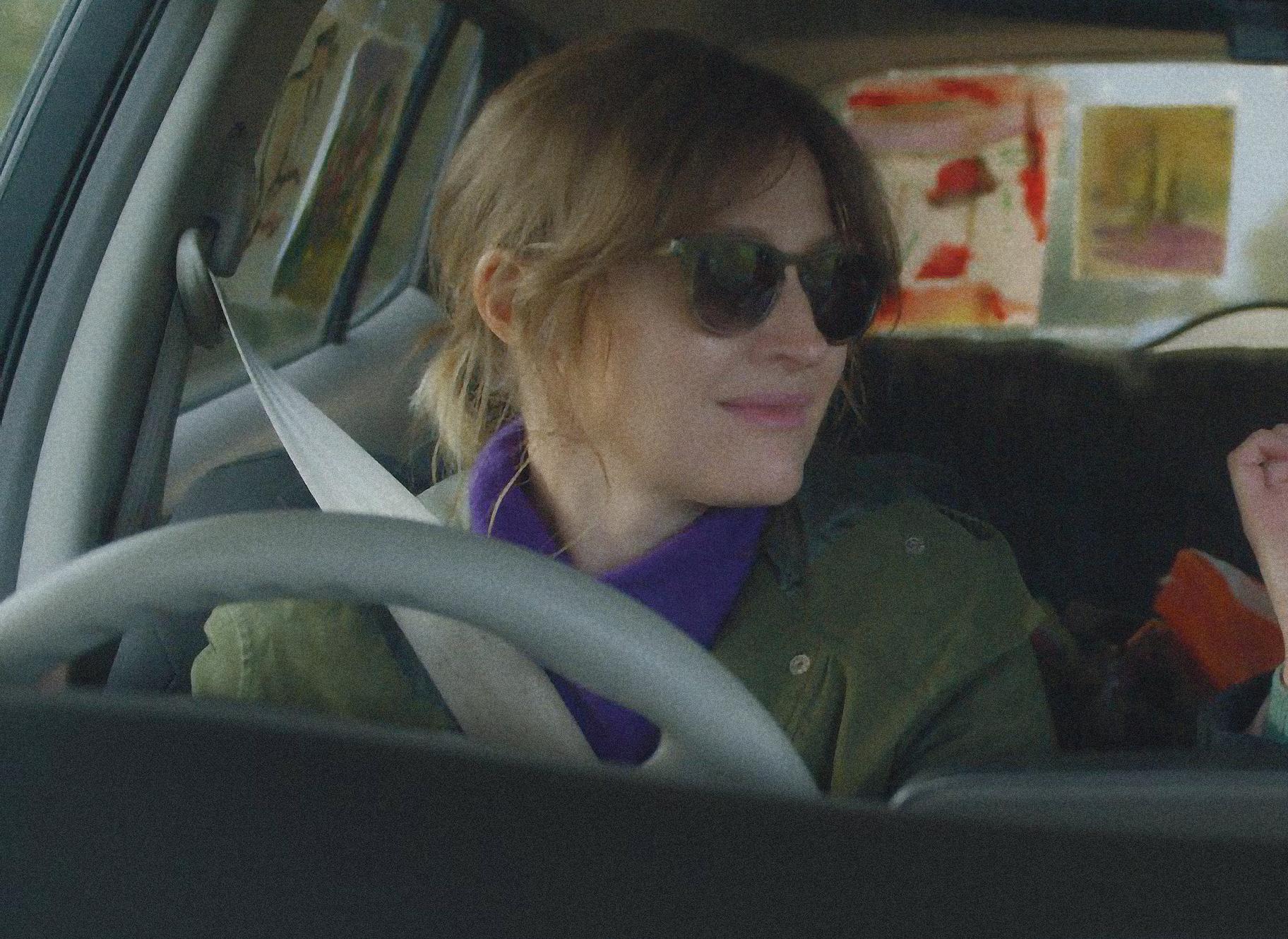
Indie Cinema Guide 8 Feature
Carol Morley makes all types of films. She’s best known for the devastating documentary Dreams of a Life, about Joyce Carol Vincent, a woman whose body was found in her London flat years after she had died. There’s also The Falling, her woozy coming-of-age film about a fainting epidemic at an all-girls school. And there was her uncanny film noir Out of Blue, based on a Martin Amis novel. Her latest is another leftfield turn. Titled Typist Artist Pirate King, it’s a road movie imagining a trip that underground artist Audrey Amiss took with her psychiatric nurse – Monica Dolan plays Amiss and Kelly Macdonald plays the nurse, and the pair take off in a dinky little yellow car, travelling from London to Sunderland on a journey that unfolds in a delightfully quixotic fashion.
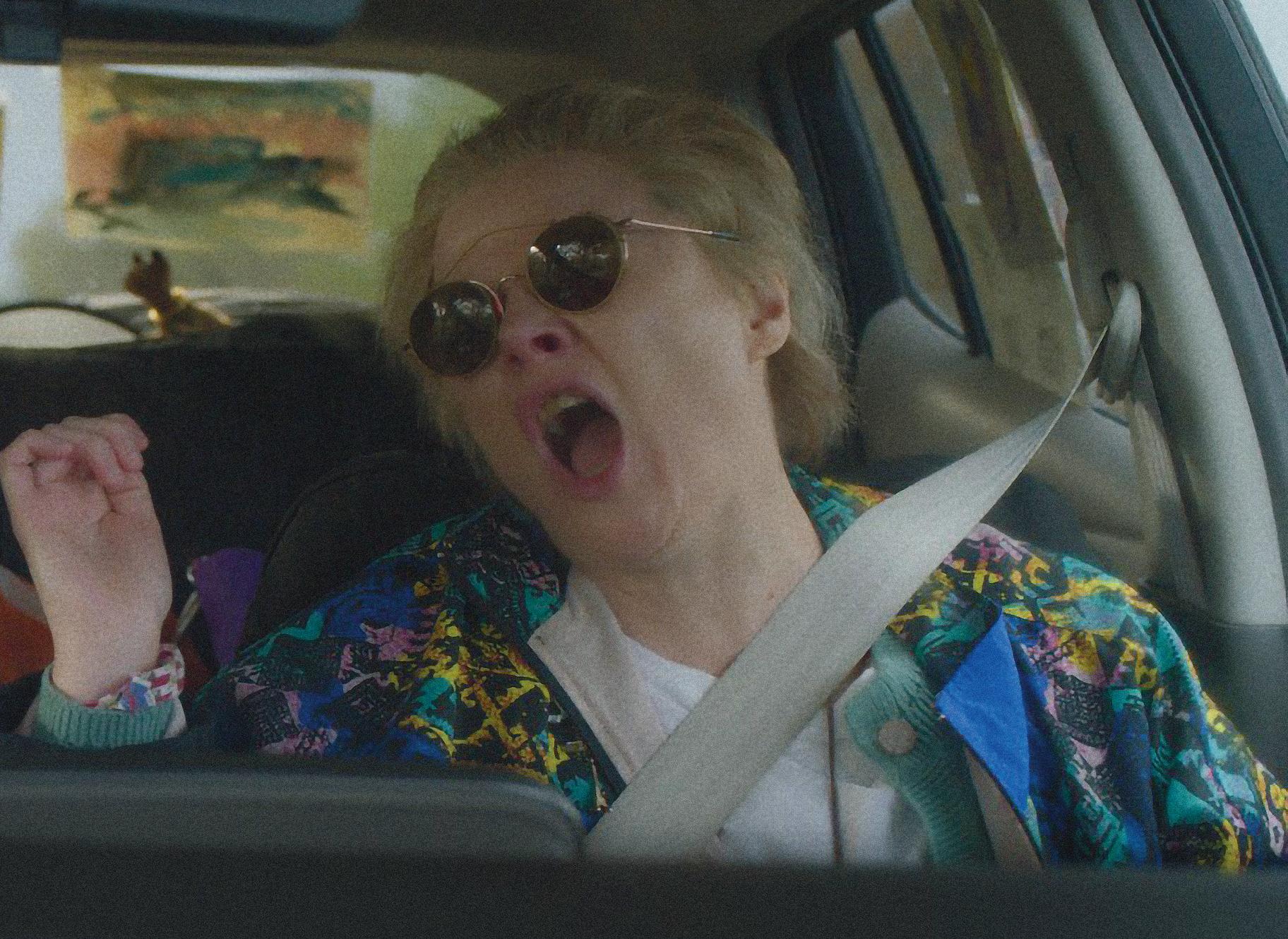
The film emerged from a year-long screenwriting fellowship with Wellcome, the science and mental health charity. Research led Morley to discover the messy archives of Amiss, a one-of-a-kind artist and mental health survivor. “Audrey was the kind of person that some people might cross the road to avoid because she’s walking along with lots of bags talking out loud,” she says. “But I loved her art, and when you open up the diaries, you see this person who was very erudite, really clever, and just had a beautiful take on the world. I realised I wanted to unleash Audrey’s voice.” At the film’s UK premiere at the Glasgow Film Festival back in March, Morley told us more.
One thing I love about your films is I never know what you’re going to make next. Do you
Autumn/Winter 2023 9
“I’ve always been quite against imposing a directorial style”
Typist Artist Pirate King
always go into a project knowing you want to make something different from the last?

I’ve always been quite against imposing a directorial style, but if I did have a style, it’s to let the story and the characters dictate. So the colours in the film come from the character and the story – the framing as well. I always want the style to be a very organic process, but by the end, once I have the story, it becomes very deliberate.
So the style here is a quixotic road movie. Why did you want to make that type of film for Audrey’s story?
It’s a process of getting to know Audrey. I think I had maybe three different ways I wanted to tell her story and then this is the one that survived – the road movie. Audrey’s good friend Brian used to liken her to Don Quixote. And Audrey said, “I think he’s right. I’m a bit batty, but there’s method in my madness.” So I liked this idea of her being heroic, and according to her family and according to her diaries, she always believed she was right, like Don Quixote. And of course, he saw giants, so I liked that element as well: how we see things, how we perceive things, how we resist what other people see.
It’s a film about Audrey’s mental health troubles but it’s also very much about Audrey as an artist, and takes her unconventional art seriously.
The driving force of the film is Audrey thinking, “I might not have long. I want to get recognition and have an art show.” That’s the simple pull through the film: here’s somebody who wants to make sure their work is seen. For Audrey, and for the character, doing the work is really important and gives her the means to live and gives her a reason to live. But the idea of recognition, and of other people seeing it, is important as well. I also wanted to explore the idea of, what is good art? What is art? What does it mean to be an artist? I don’t think the film is saying Audrey’s art was therapeutic, because I find that slightly patronising. Audrey was an artist first and foremost before her life circumstances were what they were.
And I loved how you incorporated this art into the film.
She said something like, “I used to be in the kitchen sink school of realism, but now I’m avant-garde and misunderstood.” So she kind
Indie Cinema Guide 10 Feature
Photo: Eoin Carey
Carol Morley
of threw away what she was taught and she would draw with her eyes closed and try different experiments. So her art became freer and possibly conceptually more interesting even though the early art shows just how technical she was. And she was so funny – some of the later drawings are hilarious. So I thought it would be really exciting to see the art in the film. And I had to ask myself, how do you show art on film? Because you know, I’ve seen films – and they’re very good, no disrespect – where they maybe animate some of the art and all that kind of stuff. And I thought, actually, I didn’t want to reframe it or zoom into elements or track in. I just want to show it in full frame, keep it simple, and the audience gets to see it like it’s on the wall of a gallery.
A lot of your work focuses on women who’ve fallen through the cracks. Audrey certainly falls into that category, but so does Joyce Carol Vincent. You’ve also been instrumental
in shining a light on the pioneering work of filmmaker Muriel Box. Why do you think you’re drawn to these women?
When I made Dreams of a Life, my fascination with women who had fallen through the cracks was definitely there. And it was there before! I remember I made a short film called I’m Not Here in the early 90s about shop girls. So I’m interested in that idea of invisibility; the idea of somehow not being noticed. And with Muriel Box, I think I just began to feel outraged. The injustice of it is really motivating. So now I’ve just decided I am going to do everything I can for Muriel Box, for Audrey Amiss, keeping those memories and respect alive for these people. Because we can talk about how great it is to have a debut woman filmmaker, it’s great to have some women artists, but if you don’t take care of the legacy and the history, then we’re going to be rediscovering the same women artists, the same women filmmakers, and we need to keep them up there. So I’ve realised that I really want to make sure that this rage, which it is, is actually focused and constructive. I’m not going to disappear. I’m not going to be invisible. And I’m not going to let other people disappear or be invisible.
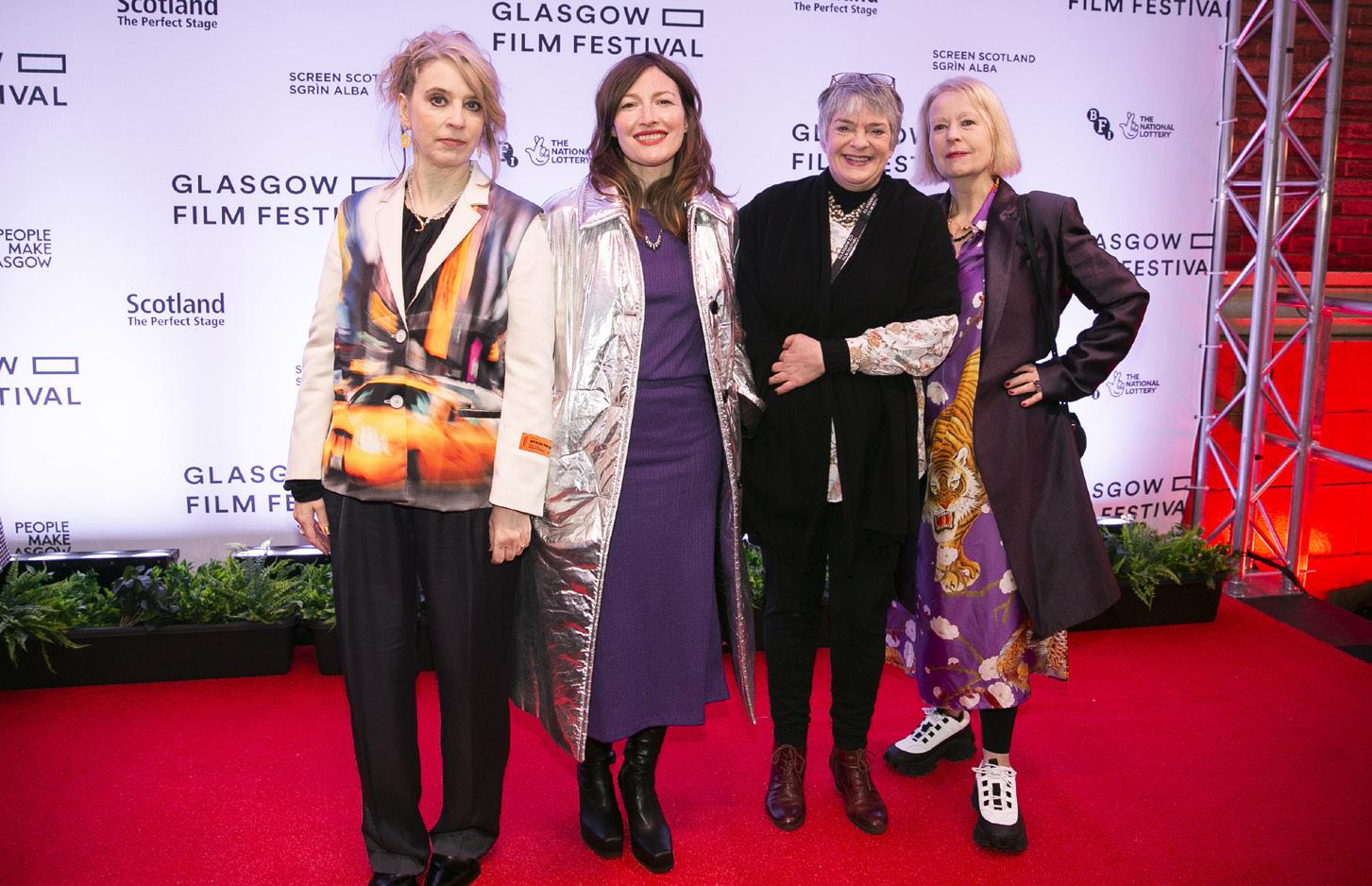
Autumn/Winter 2023 11
Typist Artist Pirate King is released 27 Oct by Modern Film
“I’m not going to be invisible. And I’m not going to let other people be invisible”
Photo: Eoin Carey
Typist Artist Pirate King on the red carpet at Glasgow Film Festival 2023
Coming Attractions
Anatomy of a Fall
Justine Triet’s latest is an icy courtroom drama concerned with the mysterious death of a man at the remote, snow-covered lodge in the French Alps he shares with his wife and son. Did he fall or was he pushed? The brilliant German actor Sandra Hüller plays the wife and prime suspect in this slippery, Hitchcockian thriller that picked up the Palme d’Or at Cannes. A court case ensues, where the marriage is picked apart and myriad secrets revealed.
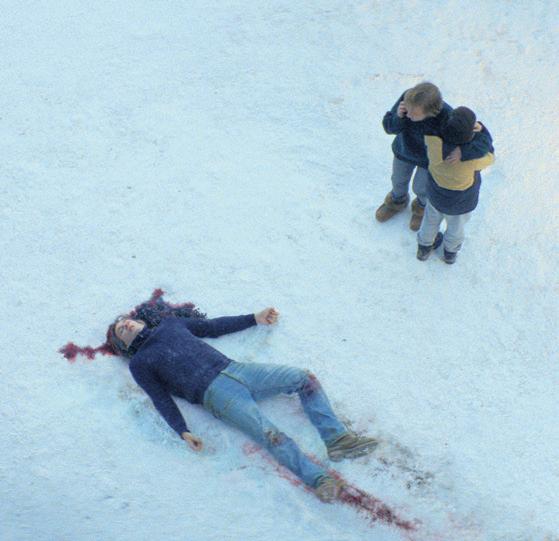
Released 10 Nov by Picturehouse
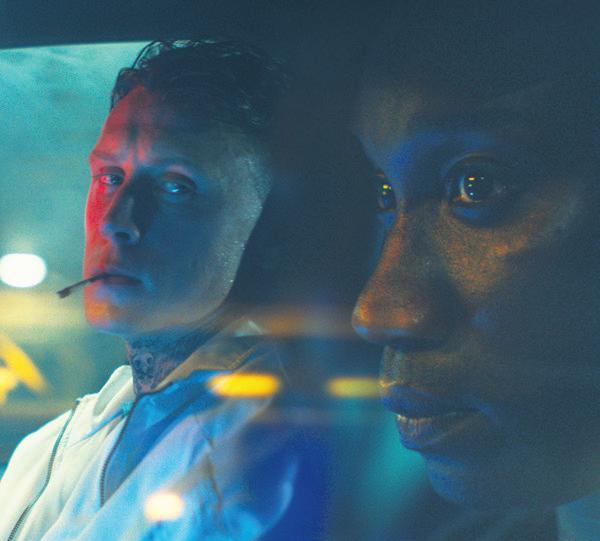
Femme
A drag queen plots revenge against the closeted thug who beat them up in this assured debut from Sam H. Freeman and Ng Choon Ping. This talented writer-director duo delve into chewy ideas around gender, toxic masculinity and homophobia while also delivering a nailbiting thriller centred on the astonishing, multi-layered, shape-shifting central performances of Nathan StewartJarrett and George MacKay.
Released 17 Nov by Signature Entertainment
The Pot-au-Feu
This gorgeous romance from Tràn Anh Hùng is pure food porn. Set during the Belle Époque, Juliette Binoche and Benoît Magimel play partners in the kitchen, making exquisite dishes for local foodies, but will they become partners in life? Tràn is one of the most sensual filmmakers around and this heady blend of culinary art and middle-age love looks unmissable. Just don’t go on an empty stomach.
Girl
Glasgow filmmaker Adura Onashile builds on the promise of her award-winning short film Expensive Shit with this tender drama following a young immigrant mother and her curious daughter as they navigate a new life in Glasgow – the mother feeling alienated by the city and its people while the daughter is keen to assimilate. A film about motherhood, trauma and growing up, shot with a huge amount of style and sensitivity.
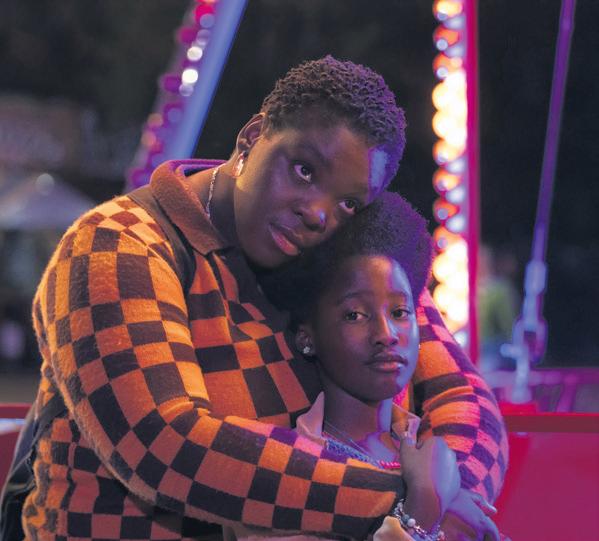
Released 29 Dec by Picturehouse
Released 17 Nov by Studio Soho
Indie Cinema Guide
Anatomy of a Fall
12 Preview
Femme Girl
Saltburn
Emerald Fennell’s debut Promising Young Woman was one of the most hotly debated films of 2020 and her second feature should be similarly thorny. A twisted class satire, it centres on Barry Keoghan as Oliver, an unassuming Oxford student who develops an obsessive attachment to Felix (Jacob Elordi), his handsome, charismatic and super-wealthy classmate. Early reviews are describing it as Brideshead Revisited by way of The Talented Mr. Ripley.
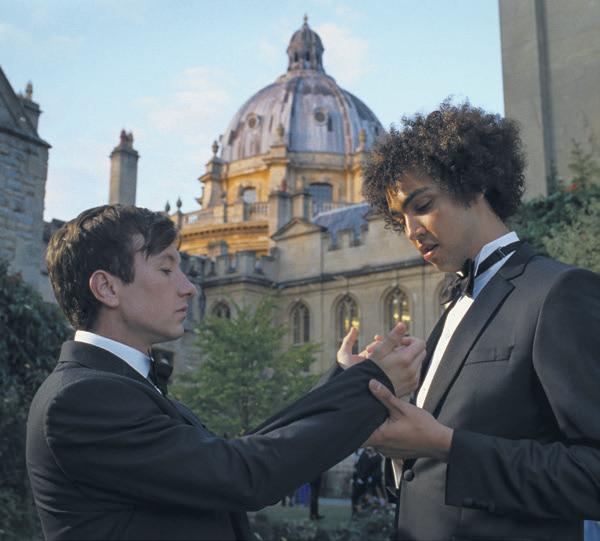
Released 17 Nov by Warner Bros
Smoke Sauna Sisterhood
In a secluded wood-fired sauna nestled in an Estonian forest, women share their innermost secrets and intimate experiences while they sweat it out. Anna Hints' charming debut is a paean to female solidarity and the elemental power of the smoky, steamy sauna. A rare documentary with a cinematic atmosphere, you’ll be enthralled as the water gurgles, the coals hiss and the women’s conversations sizzle.
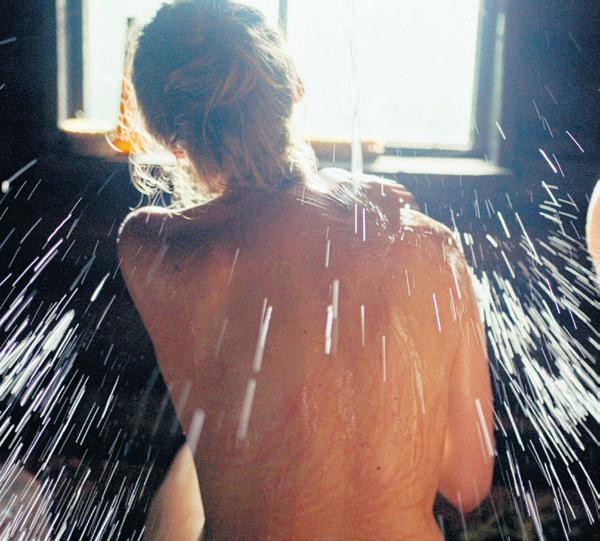
Released 13 Oct by Conic
Napoleon
Joaquin Phoenix plays Napoleon Bonaparte in Ridley Scott’s historical epic and it’s hard to think of a better choice for the tyrannical French Emperor. Scott and Phoenix last worked together on 2000’s Gladiator, and Phoenix has only grown in skill and stature as an actor. Expect huge battles from French history combined with a more intimate story of Napoleon’s relationship with his wife Josephine, played by Vanessa Kirby.
Released 22 Nov by Sony
Tish
The great social realist photographer Tish Murtha is the subject of this moving biopic from Edinburgh director Paul Sng. Murtha grew up poor in down-at-heel South Shields and spent her career documenting the lives of people from similar working-class communities in North East England. Sng’s film follows Murtha’s daughter, Ella, as she revisits key moments from her mother’s life and work.
Released 17 Nov by Modern Films
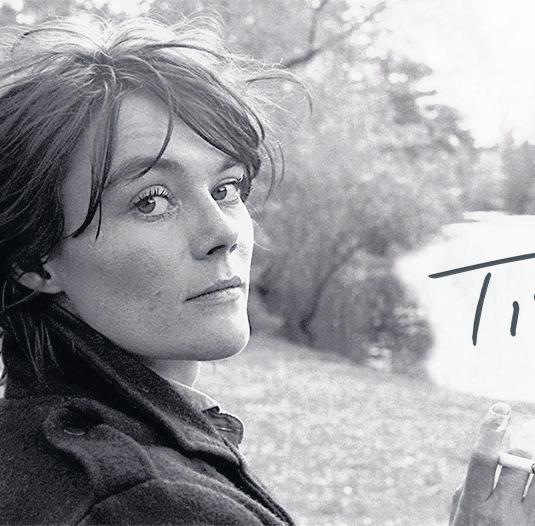
13 Autumn/Winter 2023
Tish
Smoke Sauna Sisterhood
Saltburn
The Creative Worlds of Powell and Pressburger
Powell and Pressburger are cinema’s greatest filmmaking duo. Throughout the autumn there will be ample opportunity to see their visionary films back on the big screen with a UK-wide retrospective. Ahead of this celebration, we offer an introductory guide

Words: Phillip Concannon
What does Heaven look like? In A Matter of Life and Death (1946), Marius Goring’s angelic messenger sums it up with a pithy observation: “One is starved for Technicolor up there.” We’re pretty starved for it down here these days too, and the return of Michael Powell and Emeric Pressburger’s magical films to UK cinemas feels like a blessing. There was nothing like Powell and Pressburger in British cinema when they embarked on the extraordinary run that took them from 1939’s The Spy in Black to 1957’s Ill Met by Moonlight, and there has been nothing to compare to them since. Under their production banner The Archers, they created whole worlds of fantasy, imagination and emotion.
“There’s something in the atmosphere that makes everything seem exaggerated,” David Farrar said in Black Narcissus (1947), and that observation is true of so many Powell and Pressburger films. Black Narcissus sees a group of Anglican nuns losing grip of their vows and their desires amid the swirling winds of the
Himalayas, and the fact that these mountain vistas were created entirely in a London studio adds to the discombobulating sense of unreality. Their glorious romantic comedy I Know Where I’m Going! (1945) unfolds in a similarly heightened atmosphere, as a young woman en route to marriage finds herself stuck on the Isle of Mull, where the magic and myth of this environment stirs her emotions into a tumult that manifests as a literal whirlpool in the film’s spectacular climax. The screenplay for I Know Where I’m Going! was written by Pressburger in a four-day burst, and there’s more invention and energy in its opening ten minutes than you’d find in many contemporary films in their entirety.
Pressburger was always focused on telling a clear story while Powell was the dreamer who pushed for excess, but theirs was a true collaboration that fully earned the joint written-produced-directed by credit. The whole enterprise of The Archers was collaborative in spirit, with talented craftsmen in every field
Indie Cinema Guide
Back in Cinemas
I Know Where I’m Going!
Image: courtesy of BFI
National Archive and The Film
Foundation in association with 14
ITV Park Circus Preview
being drawn into the fold and encouraged to express themselves and contribute ideas. Powell was so impressed with the care that camera operator Jack Cardiff took over lighting a second unit shot on The Life and Death of Colonel Blimp (1943), he hired him as cinematographer on A Matter of Life and Death, Black Narcissus and The Red Shoes (1948) – arguably the three most beautiful Technicolor films ever made.
The 17-minute dance sequence at the centre of The Red Shoes is the peak of The Archers’ collaborative artistry, but Powell had always dreamed of making an entirely “composed film” – a pure marriage of image and music – and he finally achieved that feat in 1951 with The Tales of Hoffmann. Perhaps this was the natural culmination for Powell and Pressburger’s partnership, and after a few more features – including the excellent and undervalued The Battle of the River Plate (1956) – they amicably parted ways to pursue different projects. These individual trajectories are fascinating in themselves, particularly Powell’s career-derailing masterpiece Peeping Tom, but nothing either of them did alone would ever reach the heights they scaled together, when The Archers fired their arrows in the service of art and expanded our notions of what the world could look, sound and feel like on the big screen.
I Know Where I’m Going! is rereleased 20 Oct by BFI
Cinema Unbound: The Creative Worlds of Powell and Pressburger runs from 16 Oct at various venues throughout the UK, including:
Glasgow Film Theatre host a wide range of Powell and Pressburger screenings, with guests, post-film discussions and many films screening from 35mm
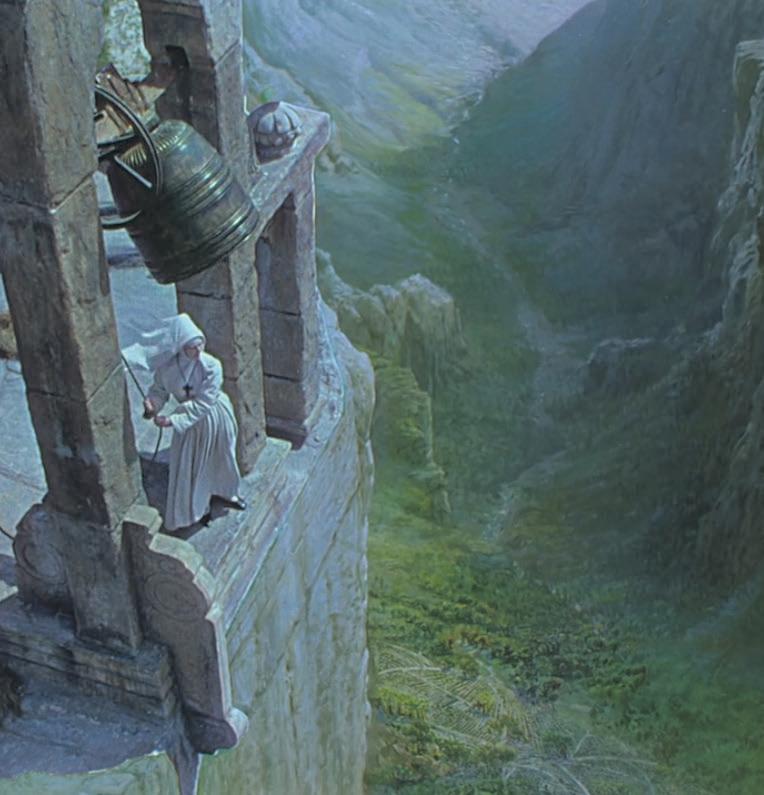
mid-Oct till late-Dec; more info at glasgowfilm.org
Michael Powell had a great love of Scotland, particularly the Scottish Islands, and throughout Cinema Unbound, Screen Argyll will be bringing these films to the communities that inspired them – including I Know Where I’m Going! on Mull in Oct
mid-Oct till Dec; more info at screenargyll.co.uk
Inverness Film Festival will offer audiences the opportunity to catch I Know Where I’m Going!, The Spy in Black, The Red Shoes and The Edge of the World
3-15 Nov; more info at eden-court.co.uk/inverness-film-festival
Dundee Contemporary Arts screen The Red Shoes (introduced by critic Pamela Hutchinson) on 3 Dec; Black Narcissus (introduced by artist Michelle Williams Gamaker) on 10 Dec; and I Know Where I’m Going! (on 35mm, introduced by curator Jonathan Faiers) on 12 Jan
more info at dca.org.uk
Glasgow Artists’ Moving Image Studio present a season of work by artists and directors working in time-based media that challenges themes in Powell and Pressburger’s work. “Expect thoughtful conversation, high campery and, of course, Kate Bush karaoke!” they say
throughout Jan; more info at glasgowamis.org
15 Autumn/Winter 2023
Black Narcissus
Image: courtesy of ITV Studios Park Circus
Cinema Map
There are great independent cinemas scattered all across Scotland. Here we’ve mapped out some of our favourites, from an arts centre in Lerwick to a film theatre in Dumfries
Mareel
Gutters Gaet, Lerwick, ZE1 0WQ shetlandarts.org/venues/mareel
The Phoenix Cinema Muddisdale Rd, Kirkwall, KW15 1LR pickaquoy.co.uk/cinema
An Lanntair Kenneth St, Stornoway HS1 2DS lanntair.com
Cromarty Cinema Cromarty, IV11 8XZ cromartycinema.com
Eden Court Bishop’s Rd, Inverness, IV3 5SA eden-court.co.uk
Highland Cinema Cameron Sq, Fort William, PH33 6AJ highlandcinema.co.uk
The Montrose Playhouse
The Mall, Montrose, DD10 8NN montroseplayhouse.co.uk
The Birks Cinema 1 Dunkeld St, Aberfeldy, PH15 2DA birkscinema.co.uk
Oban Phoenix
140 George St, Oban, PA34 5NX obanphoenix.com
Dundee Contemporary Arts
152 Nethergate, Dundee, DD1 4EA dca.org.uk
Indie Cinema Guide
1 2 3 4 5 6 7 8 9 10 18 3 6 9 3 6 9 18 16 Preview
Northern Isles
Highlands & Islands
Central Scotland
Argyll & Bute
Southern Scotland
Dundee, Angus & Perthshire
Scan the QR code above to discover the 200-plus cinemas, film festivals, film clubs, pop-ups and arts venues that make up the Film Hub Scotland membership

Macrobert Arts Centre University of Stirling, Stirling, FK9 4LA macrobertartscentre.org
The Hippodrome
10 Hope St, Bo’ness, EH51 0AA hippodromecinema.co.uk
Lanternhouse S Kildrum Ring Rd, Cumbernauld, G67 2UF lanternhousearts.org/showtype/cinema
Cameo
38 Home St, Edinburgh, EH3 9LZ picturehouses.com/cinema/the-cameo
Dominion Newbattle Terrace, Edinburgh, EH10 4RT dominioncinema.co.uk
Glasgow Film Theatre
12 Rose St, Glasgow, G3 6RB glasgowfilm.org
The Pavilion Cinema Market St, Galashiels, TD1 3AF pavilioncinema.co.uk
Campbeltown Picture House 26 Hall St, Campbeltown, PA28 6BU campbeltownpicturehouse.co.uk
The Heart of Hawick Kirkstile, Hawick, TD9 0AE liveborders.org.uk/heart-of-hawick-cinema
Robert Burns Film Theatre Mill Rd, Dumfries, DG2 7BE rbcfilmtheatre.co.uk
17 Autumn/Winter 2023
11 12 13 14 15 16 17 18 19 20 14 16 17 19 20 1 2 4 7 8 11 12 13 15 10 5 7 2 1 4 5 10 8 16 13 11 12 17 19 14 15 20
Poor Things
Emma Stone plays the subject of a surgeon’s macabre experiment in this baroque, sensual and wildly subversive coming-of-age story from Yorgos Lanthimos, based on Alasdair Gray's comic novel
Words: Anahit Behrooz
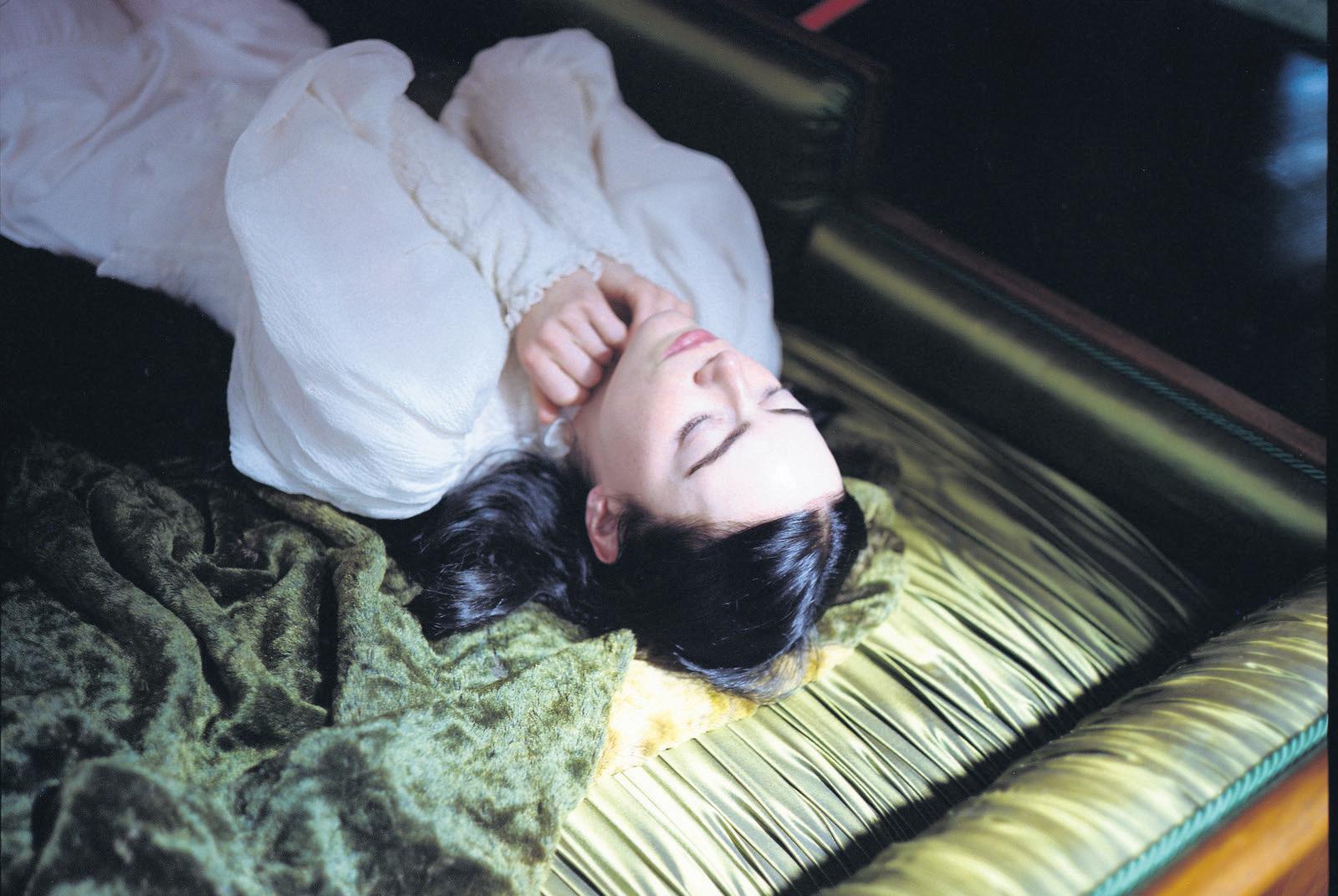
Every hero’s journey has a point where the hero crosses the threshold into the unknown, and for Emma Stone’s Bella Baxter – the protagonist of Yorgos Lanthimos’s lavish triumph Poor Things – it is when she learns to masturbate. When we first encounter Bella, she is a childlike creature living with her guardian Godwin Baxter, played by Willem Dafoe and whom she calls God with delightfully blatant symbolism. Barely stringing together words and pissing with wide-eyed pride on the floor, her whole world comprises of God’s Frankenstein-esque house of horrors, where humans plug themselves into machines and hybrid dog-ducks roam the hallways. And then, she feels a tight, unquenchable longing for something both within and beyond the bounds of her skin. And her world, desaturated, suddenly floods with colour.
Director: Yorgos Lanthimos
Starring: Emma Stone, Mark Ruffalo, Willem Dafoe, Ramy Youssef, Christopher Abbott
Indie Cinema Guide
18 Preview
Adapted from the novel by Alasdair Gray – itself very loosely inspired by Mary Shelley’s Frankenstein – Poor Things is reminiscent in some ways of the wealthy people of centuries ago, whose scented pomade and ivory teeth masked a barely disguised stench and decay. Which is to say that, for all its garish baroque trimmings and fantastical worldbuilding, Poor Things is a film that exhilaratingly resides in the body: in its bawdy, disgusting, liberating possibilities; the heady prospects of disease and pleasure and sheer, irrefutable incarnation that Bella uncovers.
The eponymous things remain, deliberately, ambiguous – it is not clear if they refer to human or animal or object – but this collapse in fixed categories is, perhaps, the point. The various ineffectual men of Poor Things are drawn to Bella’s initial childish innocence, but what they really lust after is a perceived helplessness and passivity. And she spends the length of the film refusing this objectification. Typical of Lanthimos, the camera is at times profoundly disquieting – it distorts, it spies. But it also opens out onto impossibly wide vistas into which Bella can escape. She runs away with a caddish man (Mark Ruffalo, having the time of his life in his funniest role yet) who teaches her to eat Portuguese tarts and perform “furious jumping.” She teaches herself, in this uncanny landscape of steampunk Victoriana, the tenets of Marxism. She discovers herself, both inside and out.
At its heart, then, Poor Things is a coming-of-age tale both drawn out and compressed, in which an entire youth and its intellectual and erotic education plays out through a single, unchanging body. At a crucial tipping point, Bella sits on a ship with her increasingly wearisome fling and a friend, who encourages her to read Goethe. Here, Lanthimos traces back the comingof-age genre from his own absurd, carnal interpretation to its roots in the original Bildungsroman, and in doing so, reminds us what coming-of-age really means: the acquisition of agency, both within and beyond narrative.
What is a human, after all, Poor Things asks, but an assemblage of body parts and desires animated through this agency. Organ by organ, choice by choice, Bella Baxter makes and remakes herself far from the tools and sparks of her guardian’s laboratory. Like Frankenstein’s monster before her, Bella’s journey through Poor Things is incredible and otherworldly. But it is also very much our world, seen and understood from the outside – from the freedom of the margins.
You’ll like this if you enjoyed... The Fall (Tarsem Singh, 2006)
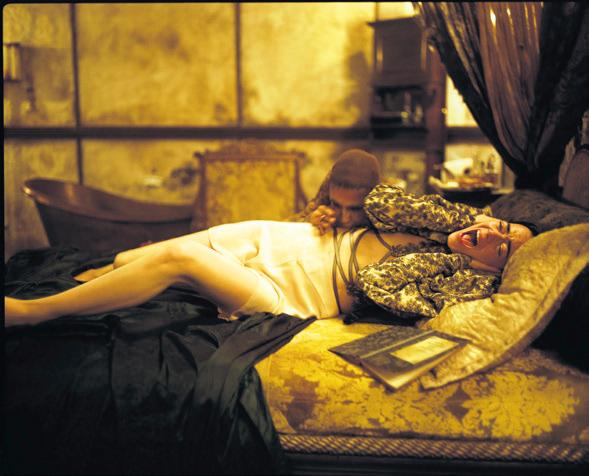
The Wizard of Oz (Victor Fleming, 1939)
Barbie (Greta Gerwig, 2023)
Poor Things is released 12 Jan by Disney

19 Autumn/Winter 2023
The Old Oak
The friendship between a young Syrian refugee and a disillusioned County Durham pub landlord helps bring two communities together in this compassionate – and possibly final – film from the great socialist director Ken Loach
Words: Zoe Crombie
Ken Loach, master of British socialist cinema, is back again with refugee drama The Old Oak, which maintains his recent return to form with angry and compassionate films documenting breadline Britain – see I, Daniel Blake (2016) and Sorry We Missed You (2019). Centring around the unlikely friendship between T.J., a gruff pub landlord, and Yara, a young Syrian woman, and set against the red brick backdrop of a North East England mining town, this is Loach in his element, handling brutality and harsh truths with the tenderness that’s carried him through since Kes
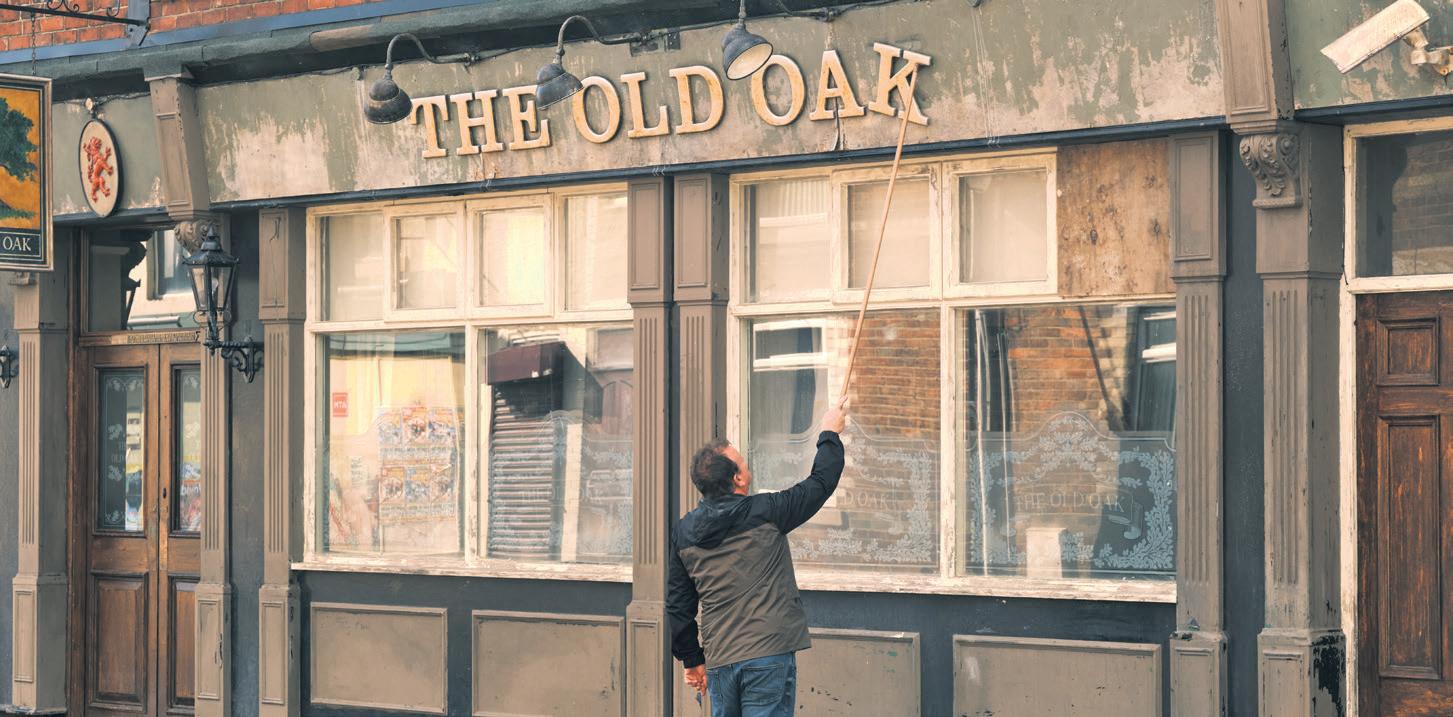
Set in County Durham in 2016 as the locals grapple in their own ways with the arrival of Syrian asylum seekers, Loach’s vision was clearly crafted in the wake of the 2015 migrant crisis – though thanks to our government and their ‘migrant barges’, the film remains devastatingly timely. Fortunately (and unsurprisingly given Loach’s oeuvre), this isn’t a film that seeks to entirely villainise either the desperate people fleeing a warzone or the working-class Northerners trying to keep their town from fading away. There are scenes familiar to any pub Marxist throughout that reveal the complexities and differences in the
Director: Ken Loach
Starring: Dave Turner, Ebla Mari, Claire Rodgerson, Trevor Fox, Chris McGlade, Col Tait, Jordan Louis, Chrissie Robinson, Chris Gotts, Jen Patterson
Indie Cinema Guide
20 Preview
views of the townsfolk, which are juxtaposed wonderfully with moments in which the refugees are quietly trying to live their lives after unimaginable upheaval.
Loach is in his typical filmmaking mode here: the visuals are pared back and simple, shot on location with unflashy camerawork, allowing for the wonderfully naturalistic performances to take centre stage. As always, the director has selected a fantastic array of talented and unknown performers here, with The Old Oak’s main strength being the chemistry between its lead actors Dave Turner and Ebla Mari, as T.J. and Yara respectively. Though their cultural differences appear to separate them at first, their shared determination and mutual love for community work brings them together, with each receiving at least a few monologues guaranteed to bring a tear to your eye.
Like most Loach films, and unlike the contemporary political climate, The Old Oak is deeply hopeful. The characters face outrageous yet depressingly believable hardships, but never throw in the towel – this resilience isn’t attributed to the strength of the individual or the importance of hard work, as is usually the case in much mainstream Hollywood fare, but the value of community and of supporting those around you when the system dooms you to fail. These themes mainly come in the form of evoking the miners’ strikes, and the spirit of solidarity that Tory Britain has sought to obliterate ever since. Throughout the film, much is lost, but in attitude much more is gained.
You’ll like this if you enjoyed...
I, Daniel Blake (Ken Loach, 2016)
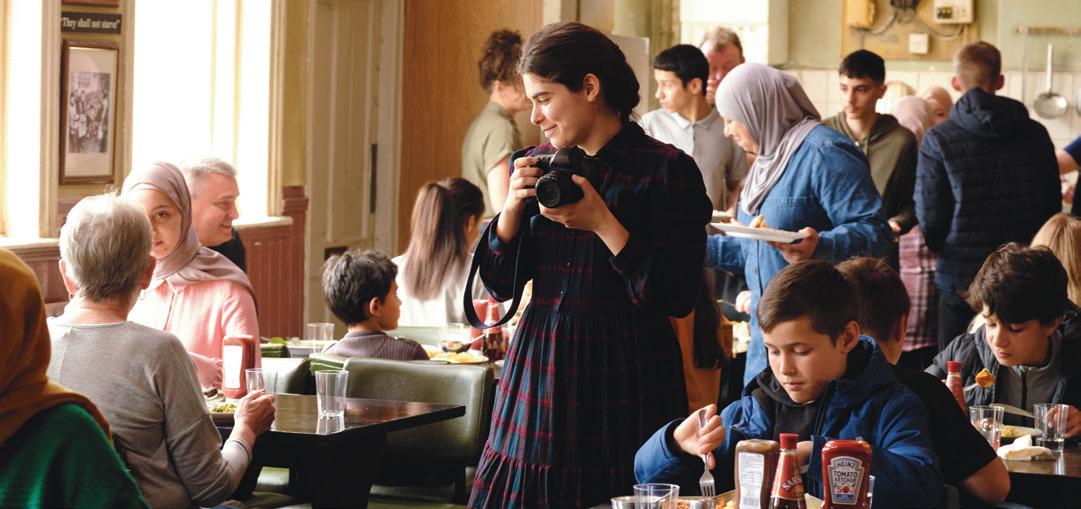
Pride (Matthew Warchus, 2014)
The Other Side of Hope (Aki Kaurismäki, 2017)
The Old Oak’s strength lies in its nuance and humanity; characters who waver and meander in their choices, the specificity of a local dialect that divides yet brings together once disparate communities, and a lack of easy answers to hard problems. If you’ve enjoyed Loach’s previous work, or if you’re looking for a film that deftly balances brutal reality with uncompromising hope, The Old Oak candidly captures a challenging moment in modern British history.
The Old Oak is released 29 Sep by StudioCanal
21 Autumn/Winter 2023
Killers of the Flower Moon
This epic tale of greed and murder – centred on fantastic performances by Lily Gladstone, Leonardo DiCaprio and Robert DeNiro – sees director Martin Scorsese working at the height of his powers
Words: Rory Doherty
On the surface, Killers of the Flower Moon seems like a film designed for you to walk out, shake your head, and bitterly remark, “What’s changed?” The 1920s-set crime film looks at the Native American Osage people, whose allotted land in Oklahoma turned out to be one of the richest oil reserves in America. This in turn made the Osage the richest Americans per capita. Despite the supplicating, genial gestures of kindness and kinship from their non-native neighbours, the Osage people were seen by white people as undeserving of such wealth, and so a slew of murders were committed to pass the land rights into white hands.
The case was handled by the then-nascent FBI, making their name in a relatively lawless America. The film depicts crimes and abuses that have a startling prescience for today. It lays bare white capitalists’ complete apathy towards any obstacle to money, the violent exploitation and displacement of Indigenous
Director: Martin Scorsese
Starring: Leonardo DiCaprio, Robert De Niro, Lily Gladstone, Jesse Plemons, Tantoo Cardinal, John Lithgow, Brendan Fraser, Cara Jade Myers, JaNae Collins, Jillian Dion, Jason Isbell, William Belleau, Louis Cancelmi, Scott Shepherd
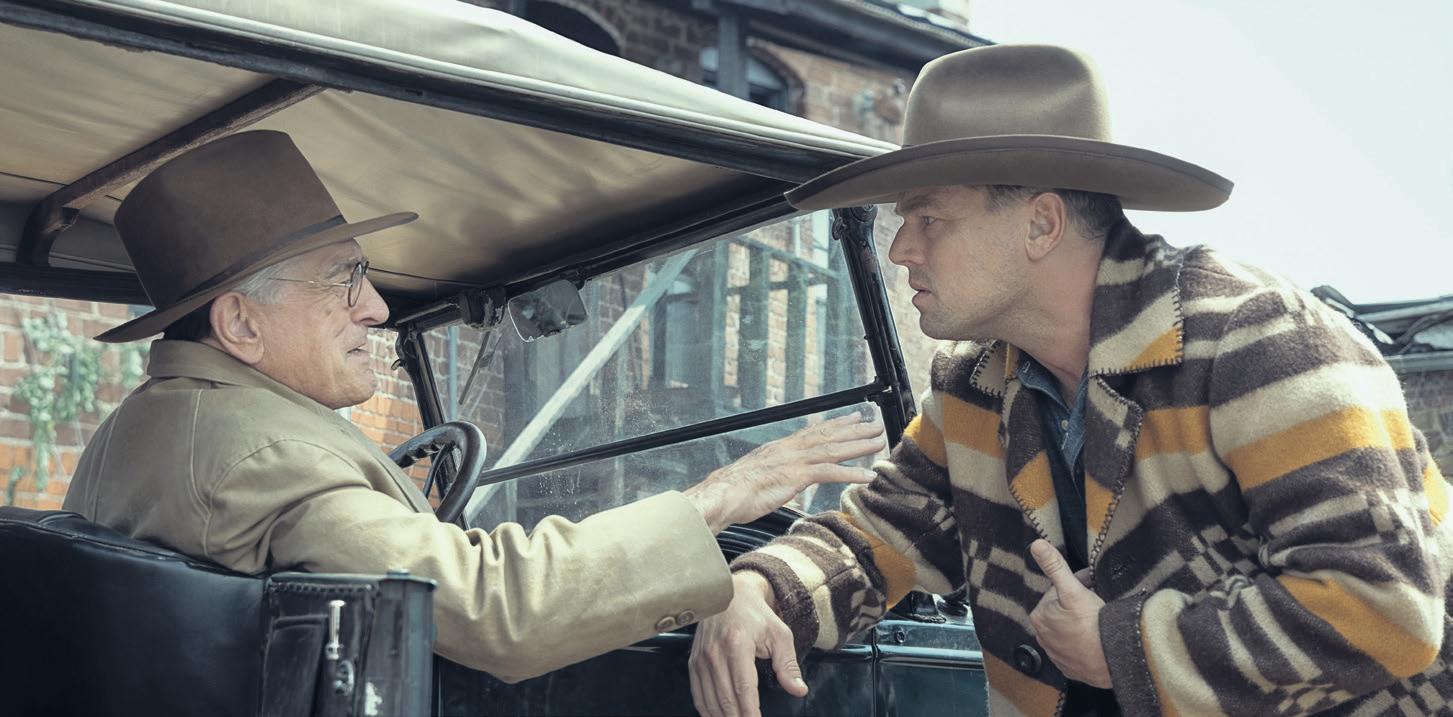
Indie Cinema Guide
22 Preview
peoples, and law enforcement’s failure to achieve justice for the communities worse affected by crime. “What’s changed?” indeed.
But Killers of the Flower Moon isn’t content to merely handwave at gross injustices – as its 206 minutes wear on, and as simple ex-serviceman Ernest (Leonardo DiCaprio) uses his sincere love for his wealthy Osage wife Mollie Cobb (Lily Gladstone) to line the bloody pockets of his businessman uncle William Hale (Robert De Niro), you find yourself knee-deep in a reeking moral sludge that hasn’t shifted much in years. Rather than uttering “What’s changed”, Martin Scorsese’s latest opus inspires feelings only provoked by the best historical dramas. You will want to fall down, tear at your hair, and curse our doomed species, not because Killers of the Flower Moon is a miserable film, but because it’s an honest one.
Based on the acclaimed non-fiction book of the same name by David Grann, Killers of the Flower Moon has all the clipped, confident pace and methodology of a rigorous piece of investigative journalism. Don’t be misled by this description: it still has all the hallmarks of this director’s engaging style. It’s energetic, dynamic, even funny; as the years pass, the 80-yearold filmmaker proves as capable as ever of balancing the epic with the intimate, the shocking with the comedic. But Scorsese’s mammoth-sized dive into depravity has sandblasted all the ironic pep and demented electricity that his earlier criminal stories like Goodfellas or The Wolf of Wall Street had baked into them.
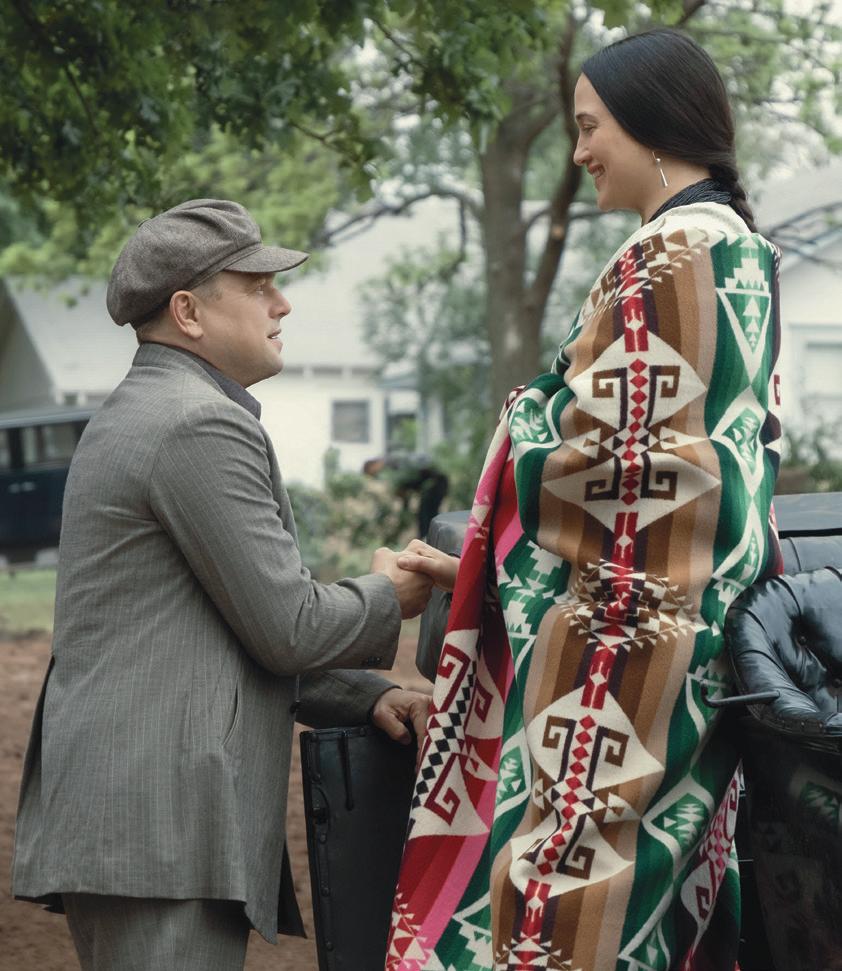
In some critical circles, the unobtrusive way in which Scorsese depicts violence and cruelty has been interpreted as a refusal to condemn his brutal characters. Nothing could be further from the truth. Scorsese’s films aren’t non-judgemental, they simply let their characters dig their own grave. Ernest and William act like nobody is watching them, and nobody will. As the sterling epilogue makes clear, history is so affecting not just because it tells us about the past, but because it acknowledges that for years nothing was done about it. Remembrance has proved insufficient, atonement hasn’t healed history’s wounds, Killers of the Flower Moon seems to argue. Grief, rage, and other full-bodied emotions seem far more appropriate.
Killers of the Flower Moon is released 20 Oct by Paramount
You’ll like this if you enjoyed... Silence (Martin Scorsese, 2016)
Memories of Murder (Bong Joon-ho, 2003)
The Power of the Dog (Jane Campion, 2021)
23 Autumn/Winter 2023
Eileen
Ottessa Moshfegh’s debut novel is brought to the big screen by Lady Macbeth director William Oldroyd as a queer-coded and delightfully unhinged noir starring Thomasin McKenzie and Anne Hathaway
Words: Stefania Sarrubba
Seven years after bursting onto the British film scene with Lady Macbeth – the austere period piece that helped put Florence Pugh on the map – theatre director William Oldroyd returns to cinema with another portrait of a lady whose fire smoulders under the ashes. Much like Pugh’s Katherine Lester in that earlier film, Eileen Dunlop’s raging inner blaze burns within an icy exterior – so much so, in fact, that this
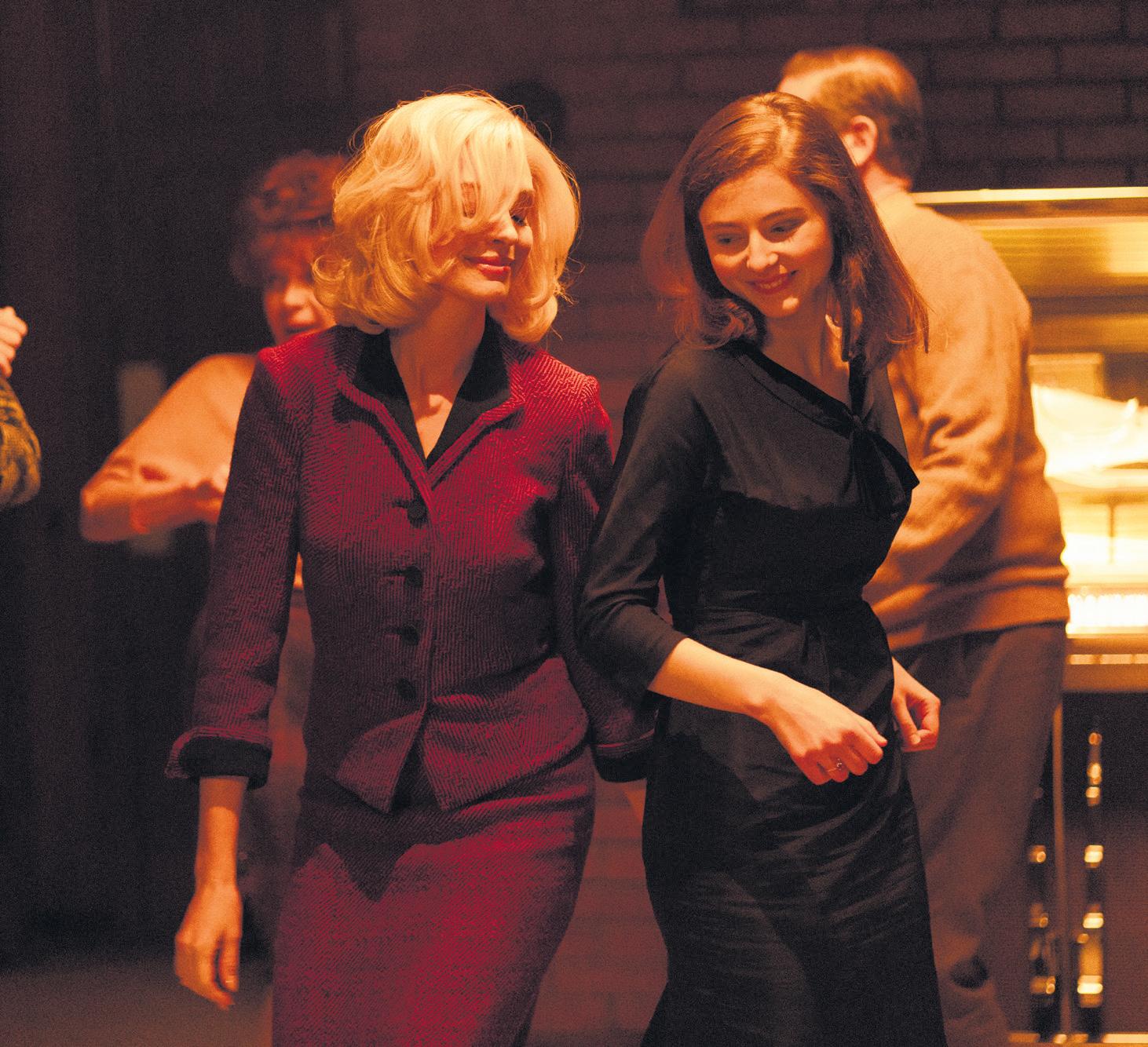
Director: William Oldroyd
Starring: Thomasin McKenzie, Anne Hathaway, Shea Whigham, Marin Ireland, Owen Teague
Indie Cinema Guide
24 Preview
demure 24-year-old has to self-repress her masturbation sessions by packing some snow down her crotch.
This amusingly startling sequence sets the scene for Oldroyd’s wild noir based on Ottessa Moshfegh’s celebrated 2015 novel. Moshfegh, working in partnership with her scriptwriter husband Luke Goebel, has adapted her own source material with great style and humour, despite her story’s heavy themes, painting a picture of a smothering New England town in the 1960s. The suffocating mood extends to the look of the film too, with cinematographer Ari Wegner, who shot Lady Macbeth and The Power of the Dog, gifting this compact tale a grainy, foggy quality that chimes well with our repressed protagonist.
That mousy heroine is played wonderfully by Last Night in Soho’s Thomasin McKenzie. She moves unnoticed against the pristine backdrop of a frigid Massachusetts winter, longing for someone to truly see her. Eileen’s dull, dead-end life passes her by in between time spent at the local juvenile correctional facility where she works as a secretary. Her home life is a different, less literal kind of prison, though no less asphyxiating. Badly measuring up to the ghost of her late mother, Eileen is constantly berated by her alcoholic father, a grief-stricken, paranoid former police officer portrayed by Shea Whigham.
This grim reality is counterbalanced by Eileen’s vivid interior world, which provides her with an outlet to shake the patriarchal constraints weighing her down. Spanning across a few, seemingly uneventful days, the film takes a turn when Eileen’s wide-eyed, love-starved eagerness finds an object of affection in the prison’s new glamorous psychiatrist. Enter Rebecca Saint John, a sultry Hitchcockian figure played with bubbly self-assurance by Anne Hathaway. Eileen is spellbound, as is the rest of the town. The two women may be very different, but they bond over both feeling out of place, and the movie steers towards a romance that doesn’t quite materialise. Eileen is more of a stepping stone in a fractured identity journey rather than a sexual awakening story, although there are distinct echoes of Todd Haynes’ more overtly erotic Carol, which resonates particularly strongly in a beautiful dance scene that lights up a sleazy dive bar.
A twist materialises, brought about by the horrific case of a young inmate. It won’t be spoiled here, but we can say that Marin Ireland (Glass Chin) in a supporting role deserves a special mention as the catalyst for the film’s jaw-dropping third act. Fully entering thriller territory without losing its wit, Eileen will shock you in its last moments as its eponymous heroine finally embraces the film’s blurry, grey areas of morality with devilish delight.
Eileen is released 1 Dec by Universal
You’ll like this if you enjoyed...
Carol (Todd Haynes, 2015)
Rebecca (Alfred Hitchcock, 1940)
Kajillionaire (Miranda July, 2020)
25 Autumn/Winter 2023
How to Have Sex
Three British teenage girls head on a trip to Crete for boozy summer hijinks, but their fun doesn't last for long in this powerful debut exploring blurry lines of consent
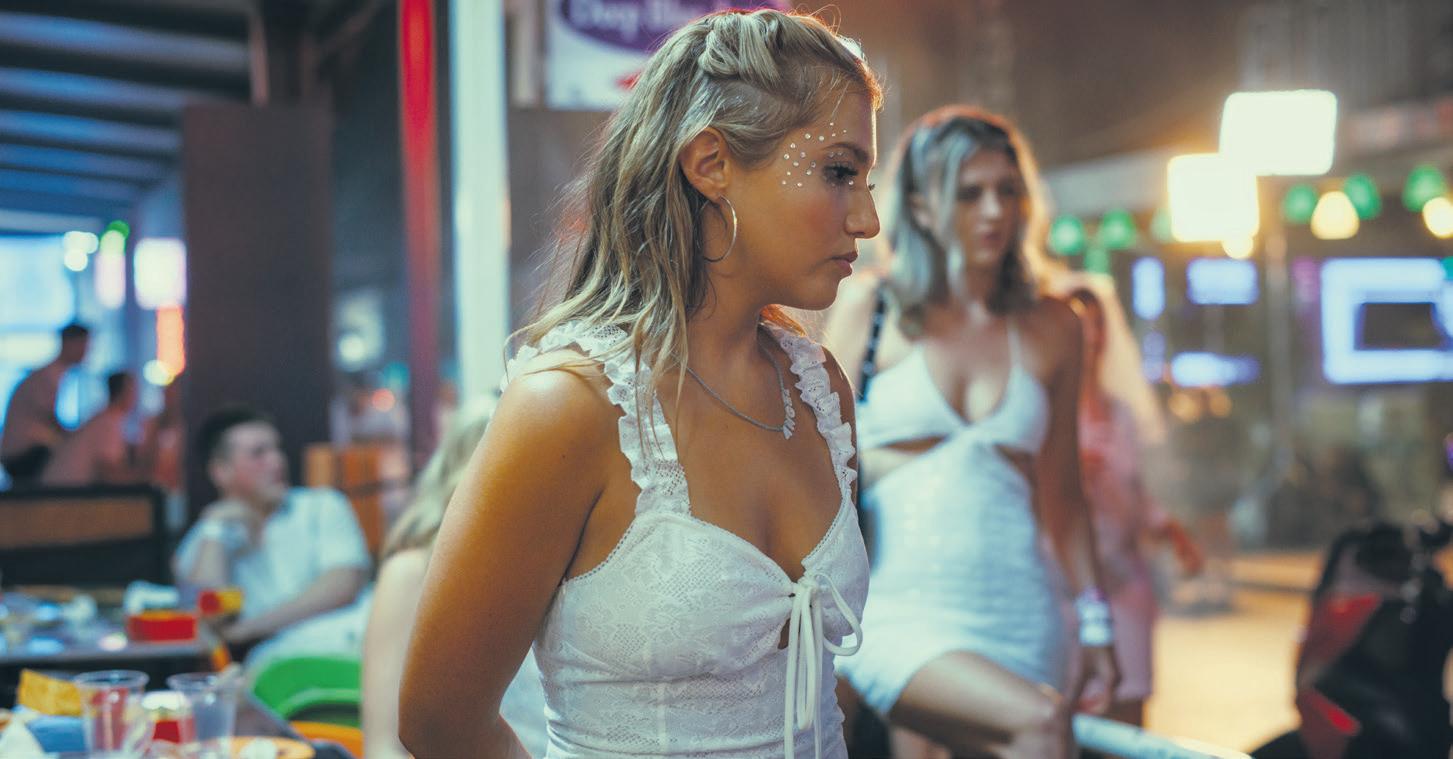
Words: Xuanlin Tham
“Best holiday ever!” three girls scream in the back of a cab, before it’s even started. Tara, Em and Skye are leaving under cover of darkness, their giggly excitement brash and loud for this time of night. The three intrepid British teens are headed for Malia, en route to a hotel where men will holler at them from the next balcony over, “Hey, sexy! Eh, smokeshow!” while the girls apply mascara. Brusque, horny mating calls fill the balmy air. Aptly, the pool downstairs is shaped like a penis.
Another surefire, confident debut helmed by a British female filmmaker (how wonderful that there have been many, as of late), How to Have Sex isn’t really the step-by-step manual of carnality its title promises. Mainly told through the perspective of Tara – a wide-eyed Mia McKenna-Bruce, with a warm and
Director: Molly Manning Walker
Starring: Mia McKenna-Bruce, Lara Peake, Samuel Bottomley, Shaun Thomas, Enva Lewis, Laura Ambler
Indie Cinema Guide
26 Preview
welcoming face – it’s a vividly painted portrait of what it’s like to be a teenage girl obsessed with sex, and simultaneously unable to talk about it in any way that matters. The girls order chips at the pool, and thrust them back and forth between their pursed, glossy lips – a comedic, vulgar gesture that in many ways summarises the only way they know how to deal with bodies and intimacy. It’s all about pretending to love it, to be okay with it, to chase the drinking and the puking and the indignity. Waking up in that bodycon dress sticky with fluids just to do it all again, because so is everyone else.
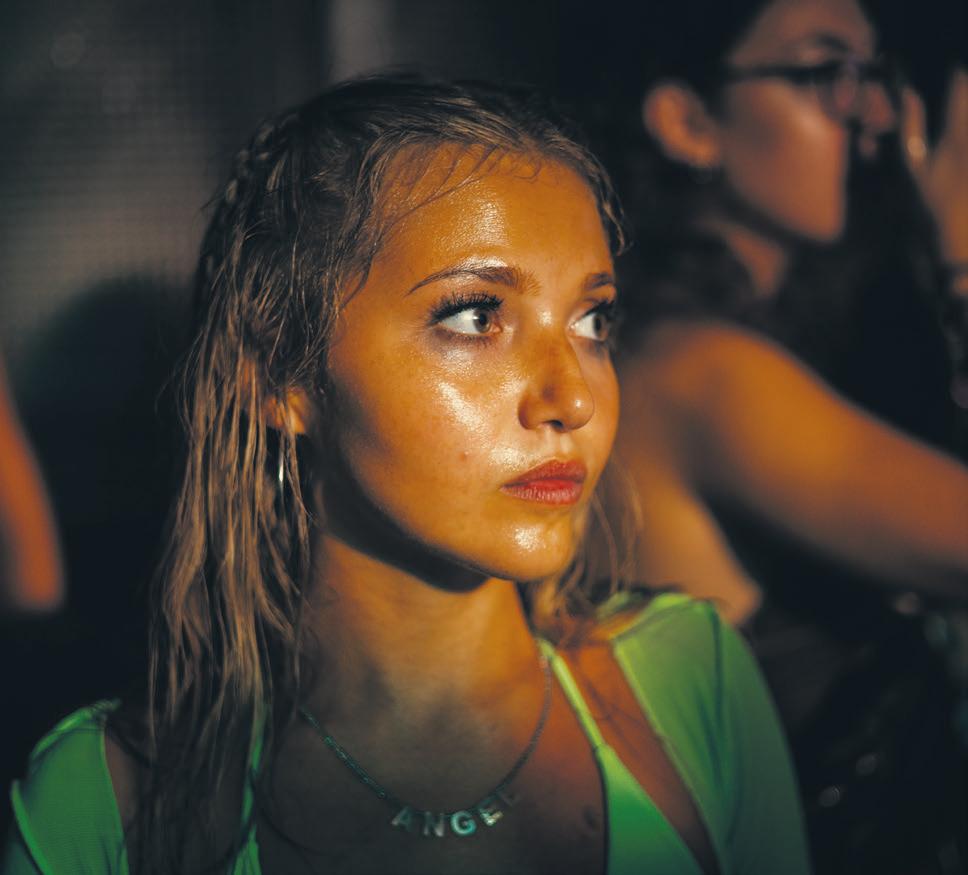
Directed and co-written by Molly Manning Walker – the cinematographer behind another British indie hit, Scrapper – How to Have Sex is a piercingly real, anthropologically precise depiction of the kind of rites-of-passage holiday entirely intended for debauchery on loop. “I can’t die a virgin!” Tara laments near the film’s beginning, and we follow her in her boozy, searching quest to accumulate sexual experience. Yet her eagerness feels like a stoic determination to adhere to some sort of external image of her sexual life, not at all like a fully rendered embrace of desire. Pleasure is far away.
How to Have Sex is a deft exploration of consent: its blurriness, the way it is never about a “yes” quietly whispered in the moment, but about a whole culture of selective loudness and silences. It’s a modern discourse where teenage girls can be “sexually liberated” and not sexual and liberated. Broadcast across McKennaBruce’s open, vulnerable face is a Russian doll of a performance. A stunned, freshly discovered trauma is cloaked within a social expectation of casual numbness, cloaked within sweaty, glittery skin shining in neon light. In Tara’s quietly imploding experience of outsiderdom, even among her best friends – and the existential fears of where life leads after high school – something rings achingly, painfully familiar about the way How to Have Sex locates the silences beneath the club music. Sometimes the only thing you can define yourself by is having something someone wants.
You’ll like this if you enjoyed...
Morvern Callar (Lynne Ramsay, 2002)
Spring Breakers (Harmony Korine, 2012)
American Honey (Andrea Arnold, 2016)
How to Have Sex is released 3 Nov by MUBI
27 Autumn/Winter 2023
Fallen Leaves
The great Finnish director Aki Kaurismäki is back with another deadpan tale of hangdog humanism and offbeat romance
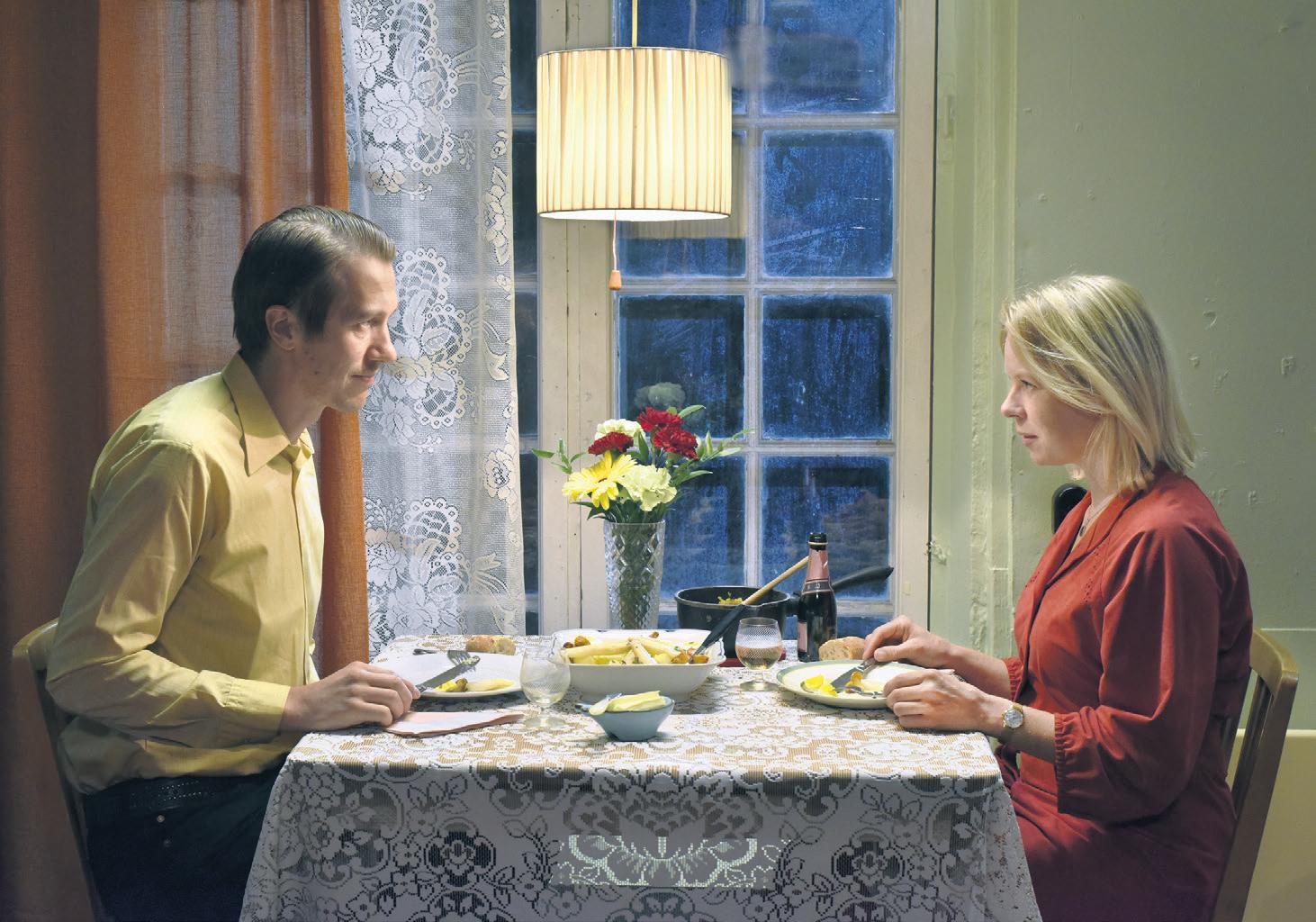
Words: Patrick Gamble
Aki Kaurismäki’s films often depict the struggles of those cut adrift by society with a heart-warming mix of comedy and pathos, and his latest is no different. A cinephile love story, Fallen Leaves sees the Finnish director devote his inimitable brand of humanism to the on-again, off-again relationship of supermarket employee Ansa (Alma Pöysti) and construction worker Holappa (Jussi Vatanen).
The pair first meet at a karaoke bar, where they lock eyes and exchange shy glances. However, they don’t actually get together until much later, when they bump into each other outside the pub where Ansa ends up working – she was fired from her previous job for stealing expired food. For their first date, the couple decide to go to their local cinema to watch Jim Jarmusch’s The Dead Don’t Die (2019) and afterwards – in front
Director: Aki Kaurismäki
Starring: Alma Pöysti, Jussi Vatanen
Indie Cinema Guide
28 Preview
Photo: Sputnik
of a poster for David Lean’s Brief Encounter (1945) – Ansa gives Holappa her number, which he promptly loses.
This missing phone number sets in motion a chain of events that threaten to keep the pair apart, but ultimately it’s Holappa’s drinking that turns out to be the film’s central conflict. “I’m depressed because I drink, and I drink because I’m depressed,’’ he tells his work colleague Huotari (Janne Hyytiäinen) shortly after getting fired for imbibing on the job. These words could have been uttered by any number of the hard-drinking characters that populate Kaurismäki’s work, but when Ansa catches him sneaking a drink from his hip flask, she tells him that in no uncertain terms will she take in a drunk. Thankfully, there’s a tenderness that pervades Kaurismäki’s unique brand of social commentary, and hope eventually prevails; even if it’s tempered by a sense of world-weariness.
Evoking the darkly comic romances of his early career, such as Shadows in Paradise (1986) and Ariel (1988), Kaurismäki has jokingly referred to Fallen Leaves as the lost fourth part of his Proletariat Trilogy, which ended on an uncharacteristically bleak note with The Match Factory Girl (1990). Three decades might have passed, but Kaurismäki’s comically glum outsiders still drink in the same dimly lit bars and listen to the same old rock ‘n’ roll songs. In fact, if it wasn’t for the periodic radio broadcasts about the invasion of Ukraine, the film could quite easily have occurred at any point in the director’s 40-year career.
An auteur in the truest sense of the word, Kaurismäki exercises almost complete control over his work, and the film features many of his trademark touches. From his vivid colour palettes and minimalistic production design to his dryly delivered one-liners and lengthy musical interludes, including a hilarious rendition of Born to Sorrow and Clothed with Disappointments by Finnish rock group Maustetytöt, it’s a treat to once again spend time in Kaurismäki’s antiquated universe. For all the retro-styling, however, Fallen Leaves very much takes place in the world we’re living in, and by giving dramatic form to the hopes and dreams of those living at the sharp end of economic austerity, the Finnish director has created his most charming film to date.
You’ll like this if you enjoyed... Down by Law (Jim Jarmusch, 1986)
The Man Without a Past (Aki Kaurismäki, 2003)
Limbo (Ben Sharrock, 2020)
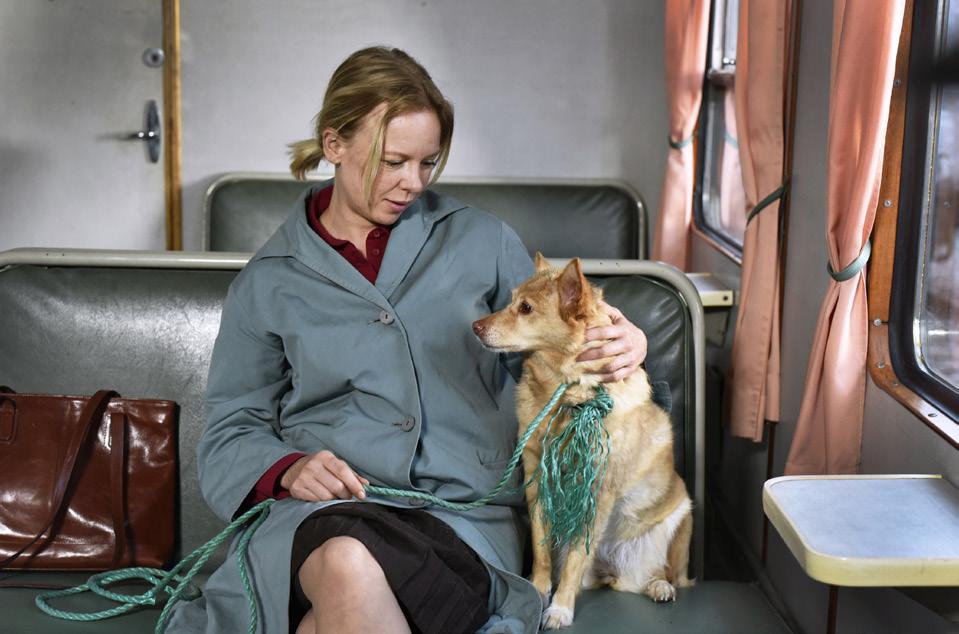
29 Autumn/Winter 2023
Fallen Leaves is released 1 Dec by MUBI
Photo: Sputnik
Indie Cinema



Wednesdays
Two-for-One Tickets at Your Favourite Indie Cinemas

Indie
Present this Autumn/Winter 2023 Indie Cinema Guide at the box office of one of the below cinemas on the first Wednesday of each month (Oct 2023–Jan 2024) to get two tickets for the price of one
Participating cinemas:
Glasgow Film Theatre
Dundee Contemporary Arts
Eden Court, Inverness
The Hippodrome, Bo’ness
The Macrobert, Stirling
Cameo, Edinburgh
Dominion, Edinburgh
Two-for-one dates: 4 Oct, 1 Nov, 6 Dec and 3 Jan
T&Cs: Standard film screenings only, standard seats only, not for use in conjunction with any other offers, non-transferable
End Credits
Across
1 The greatest film of all time – until recently (7, 4)
7 Gizmo gave birth to these little monsters (8)
8 Popular movie wars (4)
10 What every actor dreams of (5, 3)
14 Don't watch this Pasolini film with your gran (4)
15 Where you'll find the best Vue in Edinburgh (4)
18 Great eyebrows, even better movies (8)
20 Nerds have to wait till next year for part two of this sandy sci-fi (4)
21 Reportedly this rabble-rousing director's latest film is their last (3, 5)
23 What WALL-E was cleaning up (11)
Answers on page 3
Down
2 Complete this Cool Runnings quote: "You mean winter as in _______ and Eskimos and penguins and ice?" (6)
3 The typical time between two Terrence Malick or Stanley Kubrick projects (3)
4 This Mike Leigh film will turn you off camping for life (4, 2, 3)
5 Many Hollywood actors are one of these; clue, see 22 down (7)
6 The missing artefact Indiana Jones and the other raiders were after (3)
9 The 'definitive' list of 'good' movies (4,5)
11 His accomplice was only supposed to blow the bloody doors off (5)
12 The sun god played by Geoffrey Rush in 2016's Gods of Egypt (2)
13 James Cameron and Joe Dante cut their teeth on this fishy franchise (7)
16 George Clooney could be found here in the 90s (2)
17 This London hospital was the inspiration for a 1946 Boris Karloff horror (6)
19 Paweł Pawlikowski's 2013 Oscar-winner (3)
22 Many Hollywood actors have big ones of these; clue, see 5 down (3)
31 Autumn/Winter 2023
1 2 3 4 5 6 7 8 9 10 11 12 13 14 15 16 17 18 19 20 21 22 23
Compiled by Jamie Dunn
Crossword
FEATURING
A guide to the best Scottish film festivals; Carol Morley on road movie
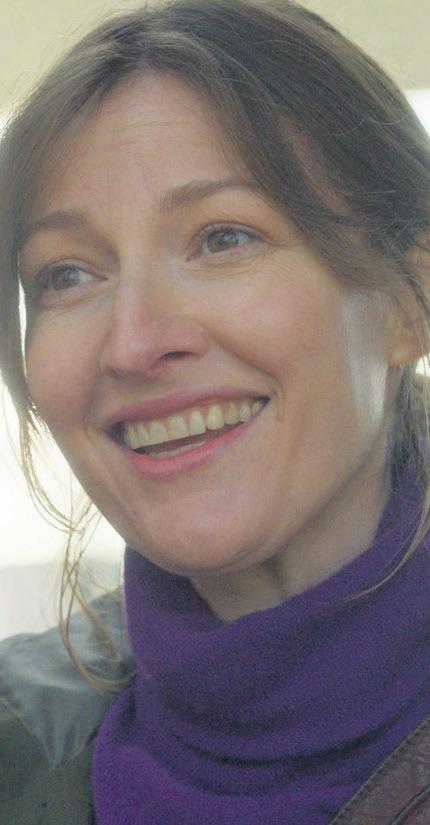

Typist Artist Pirate King ; an Indie Cinema Map of Scotland;
Previews of Poor Things, Anatomy of a Fall, Killers of the Flower Moon, The Old Oak, Fallen Leaves, Girl, How to Have Sex, Tish, Eileen, Saltburn
AND MUCH MORE!












































